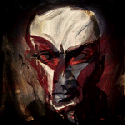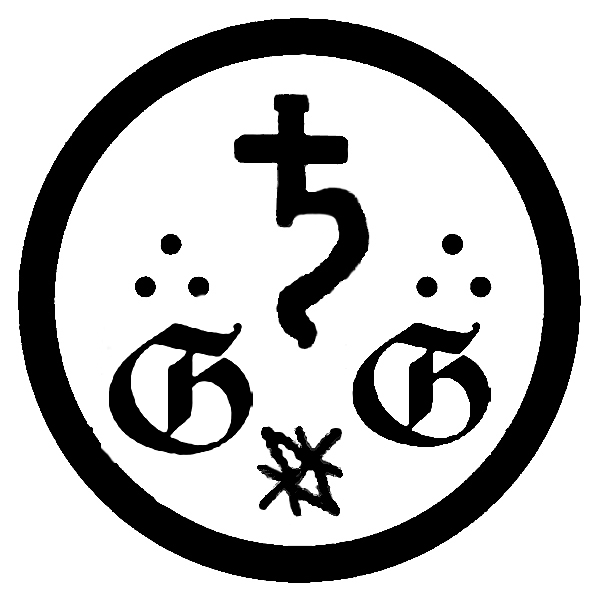Fraternitas Saturni
| 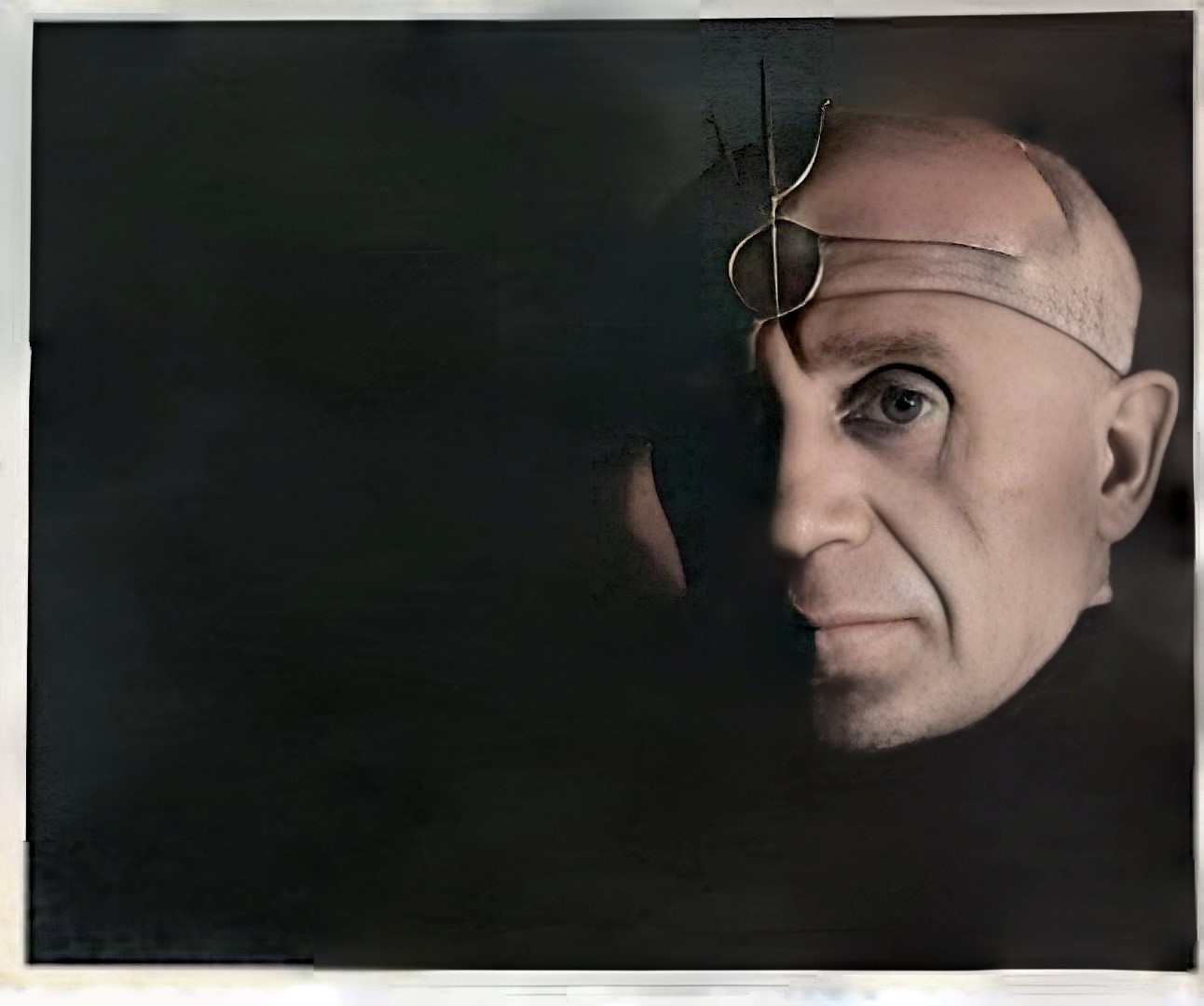
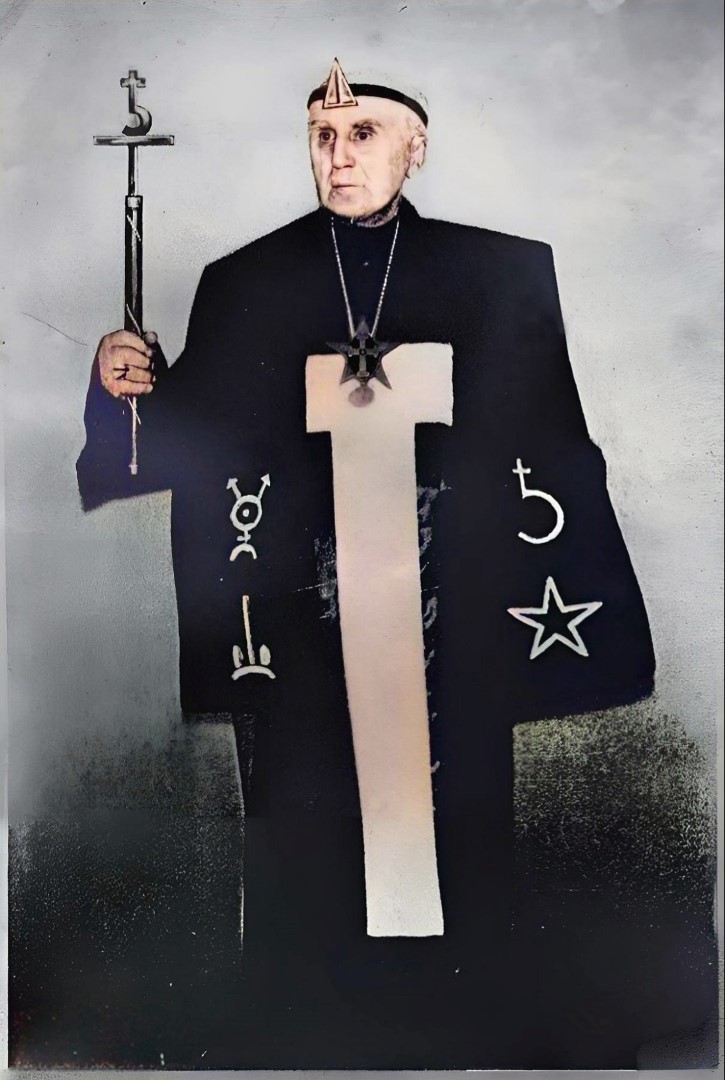
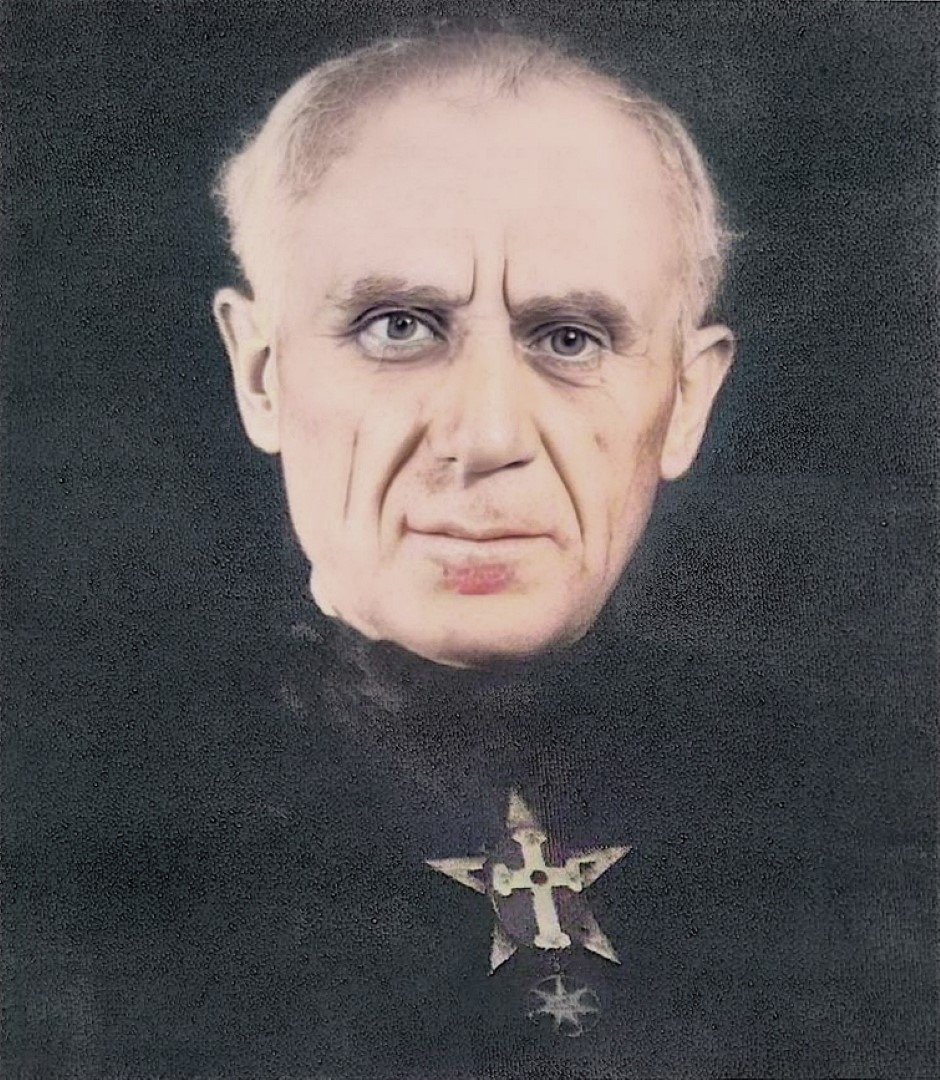
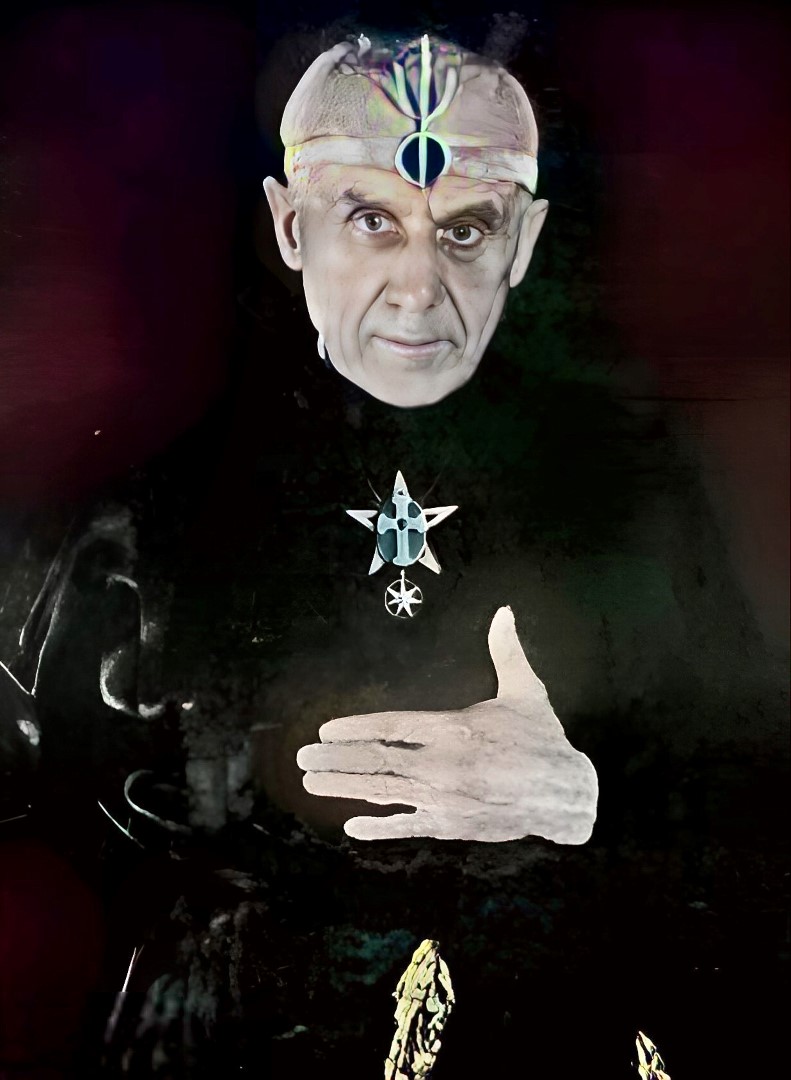

Photographs of Eugen Grosche and other members. |
|
Eugen Grosche is alleged to have come into the world at Riesa on the
11th of March, 1888. [1] Because of his parent's poverty, Eugen had
to leave the Realschule (secondary school) in Stollberg prematurely,
and take his final classes at the Volksschule (primary school) in
Leipzig.
His literary interests led him to become a bookseller by the publishing firm of Müller-Mann, and in 1911 he moved to Berlin, where he became a sub-editor on such inspiring periodicals as "Der Militär Anwärter" ("The Military Cadet"), "Der Innenarchitekt" ("The Interior Decorator"), and the "Deutsche Kohlen Zeitung" ("German Coal News"). On September 29th 1914 Grosche got married, and from this union sprang a daughter; her name Alraune, was that of a character in the 1911 novel "Alraune, Geschichte eines lebenden Wesens" ("Alraune, Story of a Living Being") by the occult novel writer Hanns Heinz Ewers (1871-1943). [2] During the Great War Grosche was a non-commissioned officer in the Sanitary Corps; after the war he became People's Commissar of the 'Independent Social-Democratic Worker's Party'. In 1919 he was fortunate enough to meet a lady who was willing to put 40,000 Reichsmarks at his disposal, in order to save her money from Germany's rampant inflation - on condition that he abstained from political activity. Thus he bought a stationery business, which he converted into a bookseller's. When the 'Kapp putsch' broke out in 1920, he was arrested and sent to the Lehrter Strasse prison; three months later the Reichs Military Court deliberated on him, under the chairmanship of Count Zeppelin's nephew: Grosche was set free. His political party then nominated him to the position of district organiser for Berlin-Schöneberg [3]. Grosche's mother worked as the housekeeper at the headquarters of the Theosophical Society in Berlin; in 1921 the Society's secretary Rudolf Steiner was supplanted by the bookseller Heinrich Tränker, who represented himself as a 'secret emissary', and immediately got money out of both Grosche and his bookshop. Grosche was given a task, too: under the name 'Gregor A.[?] Gregorius' [4], he was commissioned by Tränker to establish a 'Pansophical Lodge' in Berlin. At Tränker's behest, Grosche was obliged to assimilate esoteric knowledge from such people as one Herr Peschke, an astrologer, and from Paul Linke - a hypnotist, magnetiser, and healer. Tränker also introduced Grosche to publishers like Otto Wilhelm Barth, and Hugo Vollrath (1877-1943), who encouraged him to found the 'Inveha' occult emporium. In the rear premises of this bookshop esoteric meetings took place. Albin Grau "Pacitius" became the first chairman of these Berlin brethren seeking enlightenment. He was born on June 13th 1884 at Schönefeld near Leipzig, and like Hermann J. Metzger, began his working life as an apprentice baker; then he became a student at the Leipzig Academy of Art. In the Great War he was at the Russian front, but afterwards was employed as a commercial artist - first the by North German Lloyd company, then various other shipping lines, finally working for the German railway; 'Pacitius' was also an enthusiastic mountain-climber. He then worked in films, collaborating as script-writer, costume-designer, and set-designer for UFA productions. He worked on films such as "Dr. Mabuse", "Vampire", and "The Cabinet of Dr. Caligari", also collaborating with others as production-designer for the Decla Construction firm on "Pietro the Corsair" (directed by Dr. Robison), and "The Nibelungs" (directed by Fritz Lang, 1922). [5] In the credits of Friedrich Wilhelm Murnau's film "Nosferatu" (1922), "Alwin Grau" is mentioned as being responsible for the sets; the production-company for "Nosferatu" was 'Prana-Film' of Berlin - 'prana' being an esoteric term that had already been used as the title of Hugo Vollrath's Theosophical periodical. Since the script of "Nosferatu" bore such a close resemblance to Bram Stoker's novel "Dracula", the ensuing court-case over copyright bankrupted Prana-Film. [6] "So far as I am concerned, I have thus far recieved the higher degree of Magister Aquarii from my predecessor Mstr. Pacitius previously in the Pansophical Lodge, and from Mstr. Recnartus the 16-18 degree of the R.C., and also from him in his character as an O.T.O. Master, the 5th degree in the O.T.O., as confirmed by Therion." - Grosche on the 7th of July 1959). [7] In 1925 Crowley was visiting Tränker and Karl Germer. Albin Grau was not alone in coming "unhappily, too late" [8] to regret having ever sided with Crowley. The secret German côteries around Tränker split into three groups: Tränker's O.T.O.-Pansophy; Küntzel and Germer's Thelema-Verlag; and a new development of the Pansophical Working Group in Berlin - the Fraternitas Saturni. |
[Eugen Grosche's letters to Aleister Crowley.]
In Nomine Demiurgi SaturniOn May 5th 1926 "Gregorius" and "four Fratres" formed a 'Working Group' within Pansophy in Berlin: the Fraternitas Saturni. In that same year Grosche's book "Satanistische Magie" ("Satanic Magic") appeared, in which he boldly linked together Satan, the Virgin Mary, and the Barbelo-Gnostics. [9] Under Grosche's leadership, it appears that some forty out of Pansophy's sixty members severed their links with Tränker, and after the dissolution of the Berlin branch of Pansophy, constituted themselves on April 4th 1928, with what they described as "pitiless love", into the Fraternitas Saturni; the first autonomous Thelemic organisation (i.e. independent of Crowley, while still accepting the Law of Thelema). The Constituting Assembly took place on 11th May 1928. Thus, on the day of its foundation, the FS robbed Pansophy (and its associated O.T.O. lodge) of the majority of its adherents. The thirty-three degrees of the AASR were reduced to ten; though it is unclear in which of these degrees sex-magic was practiced. The fifth degree was called 'Gradus Pentalphae', whereas the Tau symbol, [10] important in sex-magic, belonged to the eighth 'Templarius' grade. [11] The official inauguration of the FS had already been advertised a year before in "Vehlow's Astrological Almanac". [12] In a letter to Gerald Yorke dated February 24th 1954, Henri Birven opined that Albin Grau should have been appointed as first Grand Master of the FS. But then Grosche stole a march on Grau by obtaining 30,000 Reichsmarks from a princess in exile. Later in 1960 Grosche published a Pansophical ritual [13] clearly influenced by Thelemic and Saturnian ideas, which possibly shows that Pansophy and the FS were not as far apart as once thought. [14] But this ritual had no doubt been developed by the FS Working Group inside Pansophy, and can hardly be seen as representative of the whole lodge's ethos. Karl Germer had this to say of the matter: "As I was co-founder of 'Pansophia' in 1922, I know of course all about Fraternitas Saturni, and the people back of it. Grosche was a sex-maniac, dabbled in hypnosis and drugs - one of the lowest types of occultist I ever met. Grau was a good man, but was too deeply entangled with Grosche and Tränker... He could not extricate himself and never saw the light. None of these people knew Crowley 'well'. They met him only once - possibly twice! None could speak English. I had to translate and they quickly fell by the way-side... The FS had nothing to do with A.C. nor A.C. with them." [15] Constitution of the Fraternitas Saturni May 1928 |
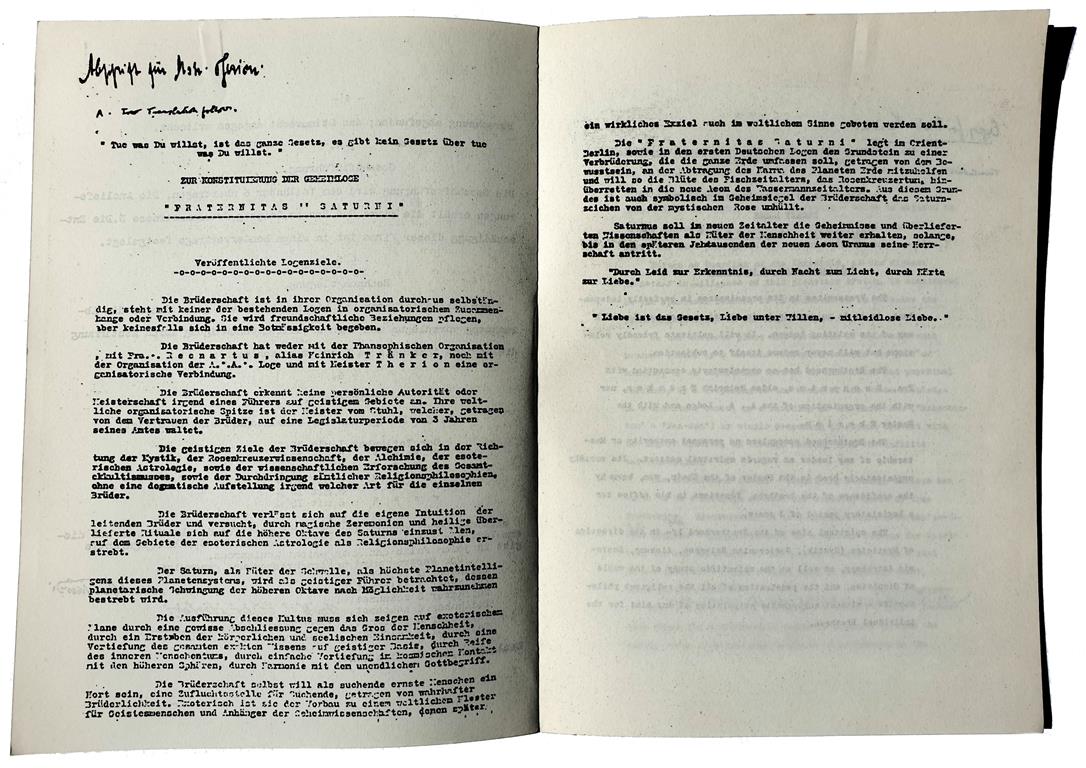
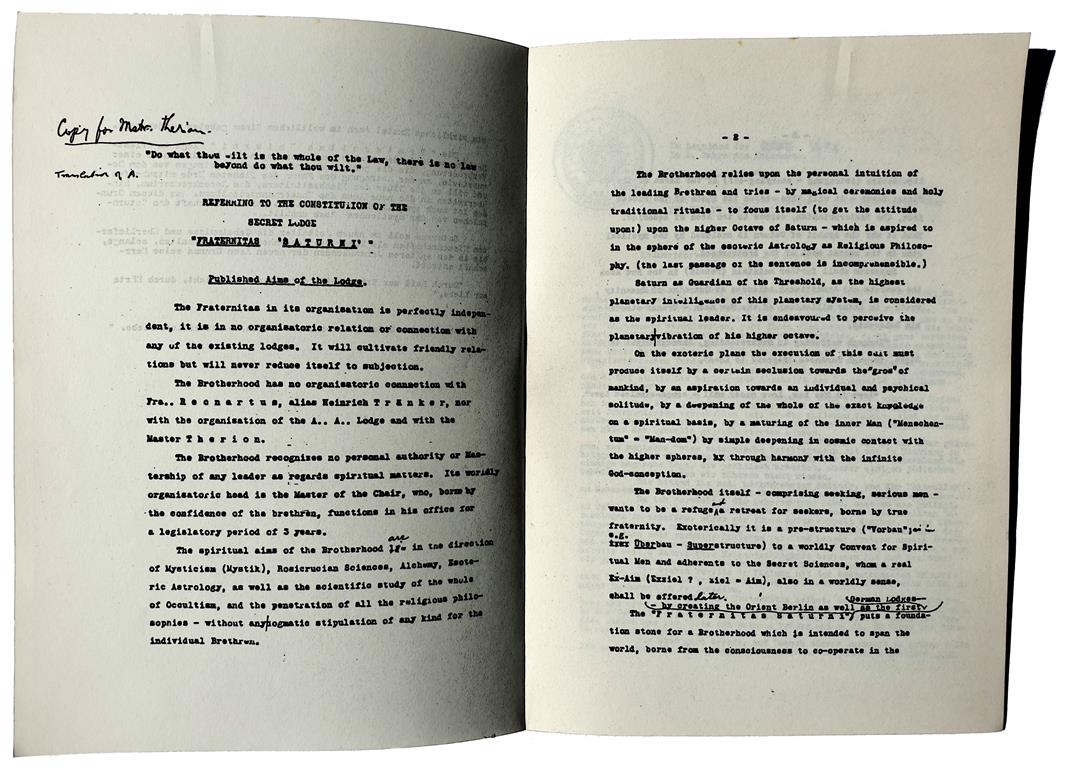
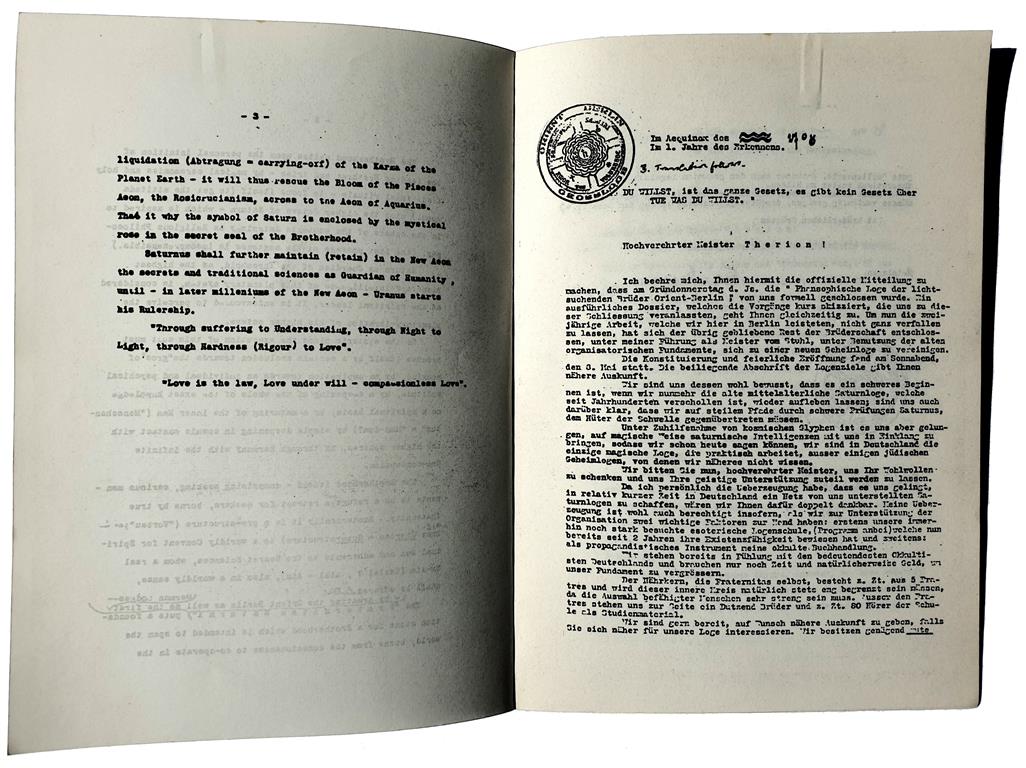
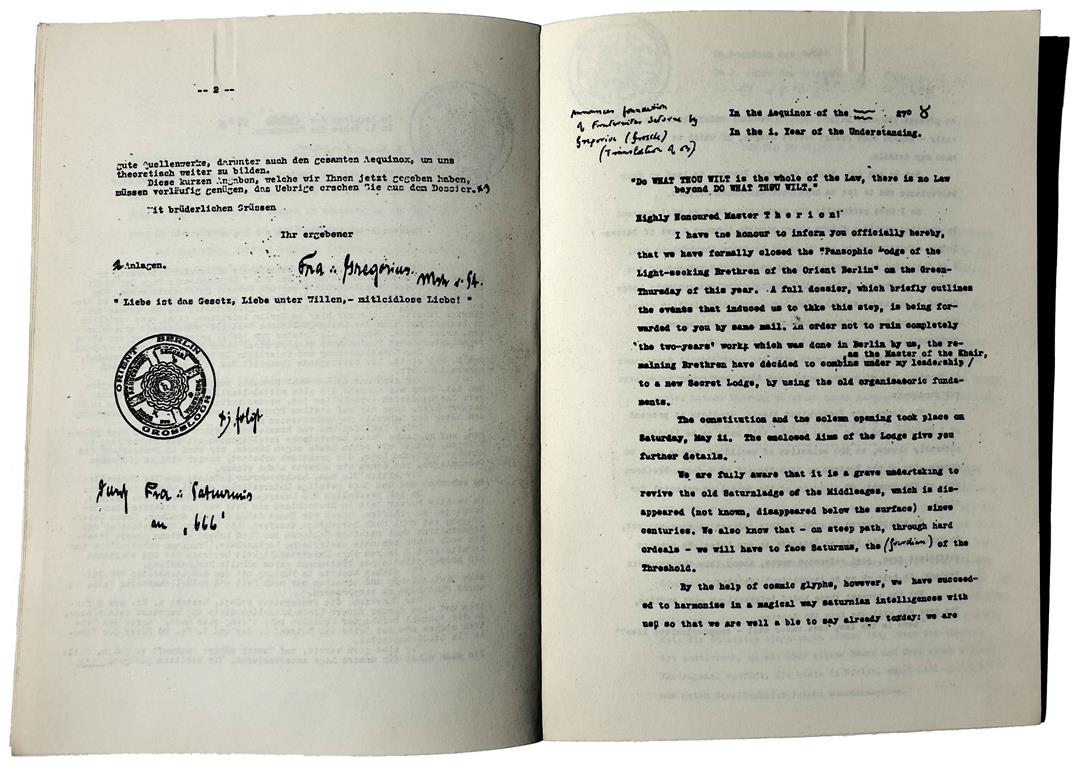
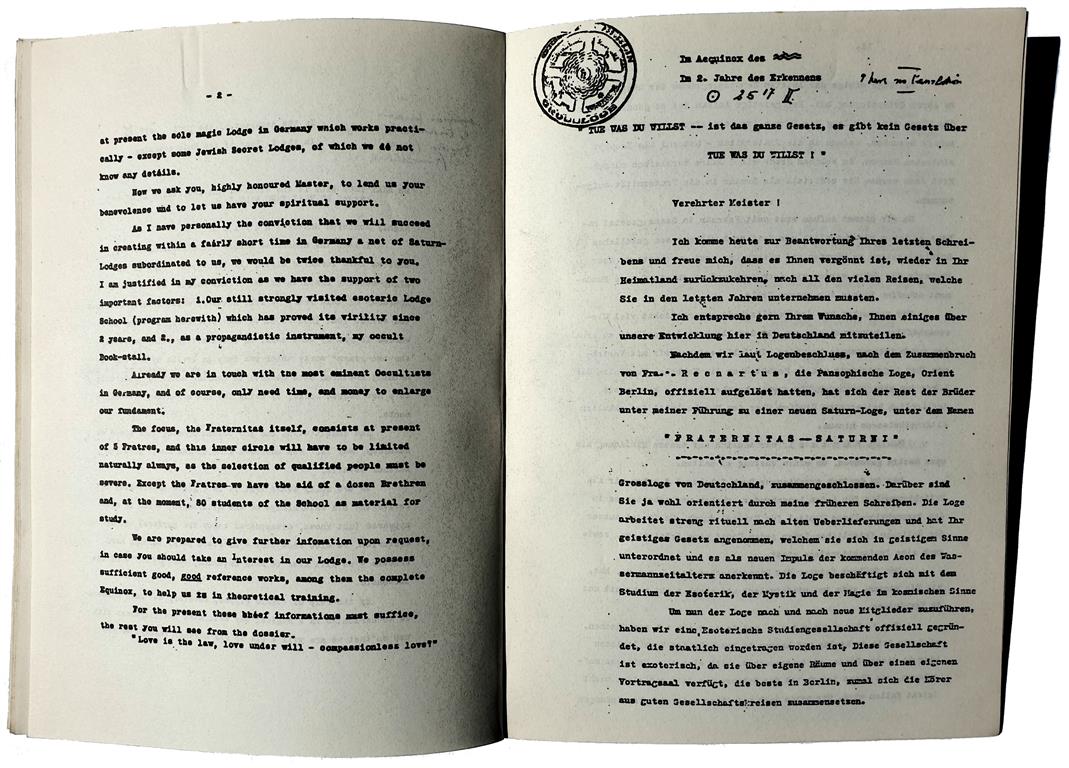
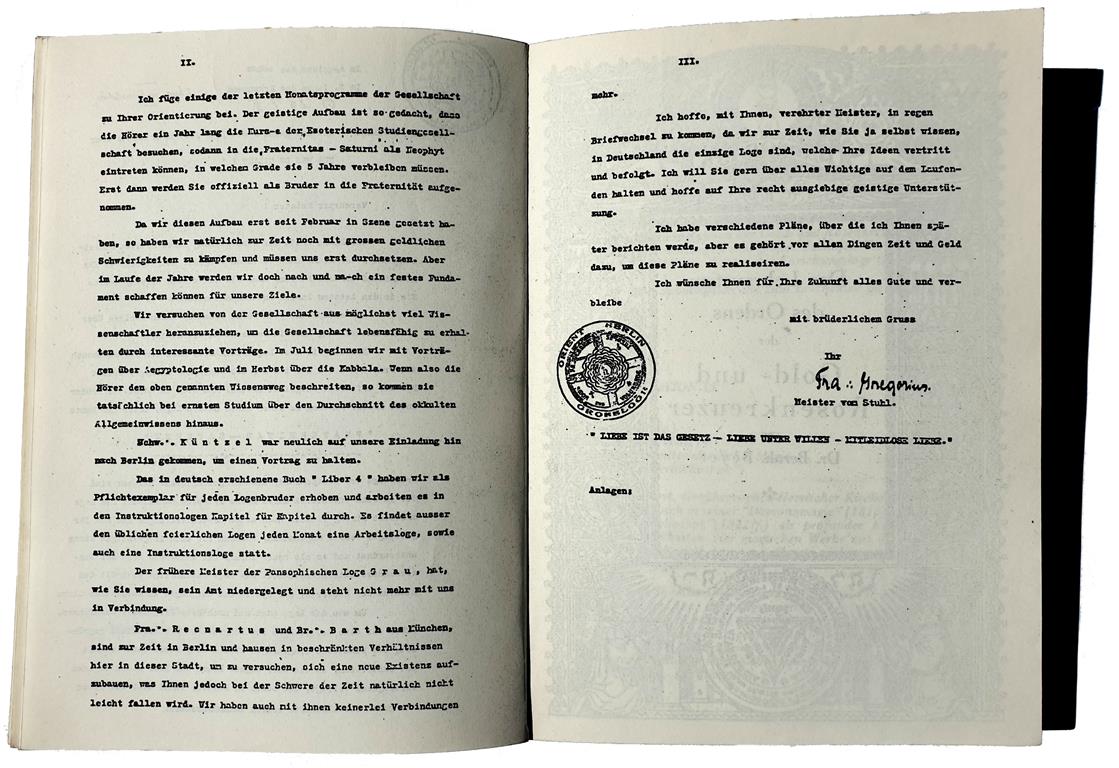
From: Aythos (Walter Jantschik): "Die Fraternitas Saturni", A.R.W., Munich 1979.
The Adonists [16]For just a few weeks in 1928, the FS was allied with the 'Adonistic Society', a sex-magical group founded on May 1st 1925 [17] by Franz Sättler "Musallam" (1884-1942?) the guru of Franz Bardon, whose works on magic would later have an unaccountable success in both German and badly-translated English. The alliance was negotiated by Wilhelm Quintscher "Rah-Omir, Ophias, Chakum Kabbalit". On March 13th 1928, the alliance with the "Order of Mental Builders" (this was another name for the Adonists) split up; many members of it entered the FS [18], and after January 3rd 1929 "purely businesslike" relations alone existed between the FS and the remaining Adonists. [19] |
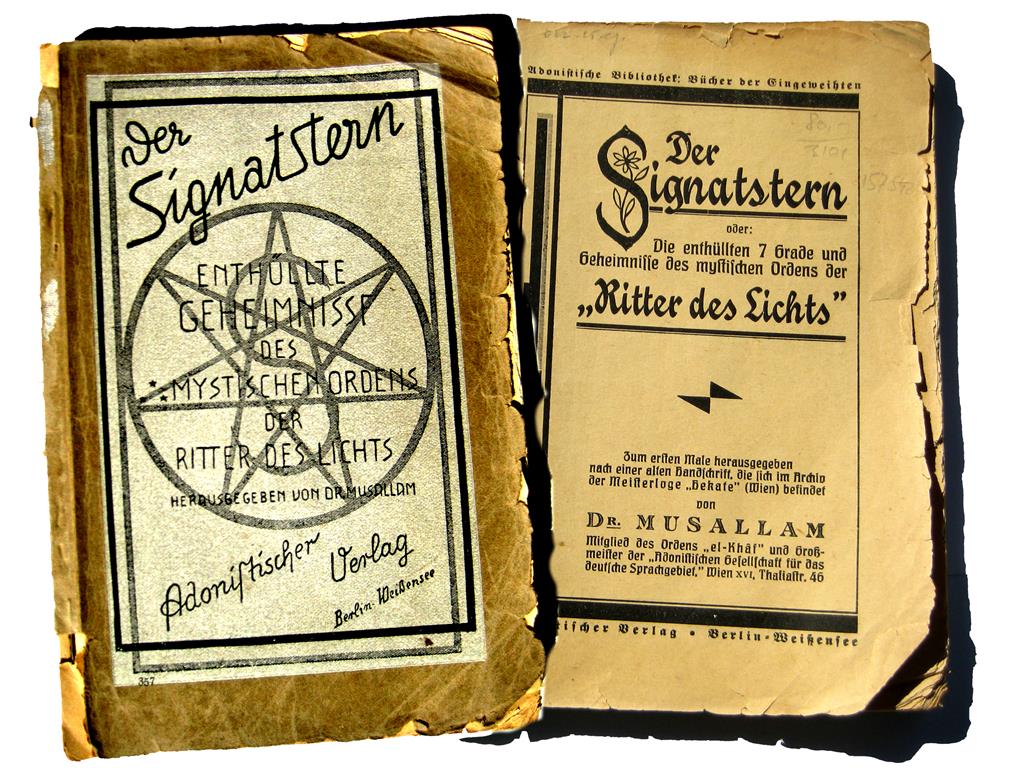
| Enthüllte Geheimnisse des .·. Mystischen Ordens der Ritter des Lichts. Herausgegeben von Dr. Musallam. Franz Sättler. Hekate. el-Khâf. Adonistische Gesellschaft. Adonismus. Adonistischer Verlag. — Berlin-Weissensee, ohne Datum. |
|
English: Theodor Reuss and the Brothers of Light in the Seven Churches of Asia. The origins of Brotherhood of Light of Theodor Reuss.
Deutsch: Die Brueder des Lichtes der sieben Gemeinden in Asien. Theodor Reuss' Hermetische Bruderschaft des Lichtes. Français: Les Frères de Lumière dans les Sept Églises d'Asie. Les origines de la Fraternité de Lumière de Theodor Reuss. 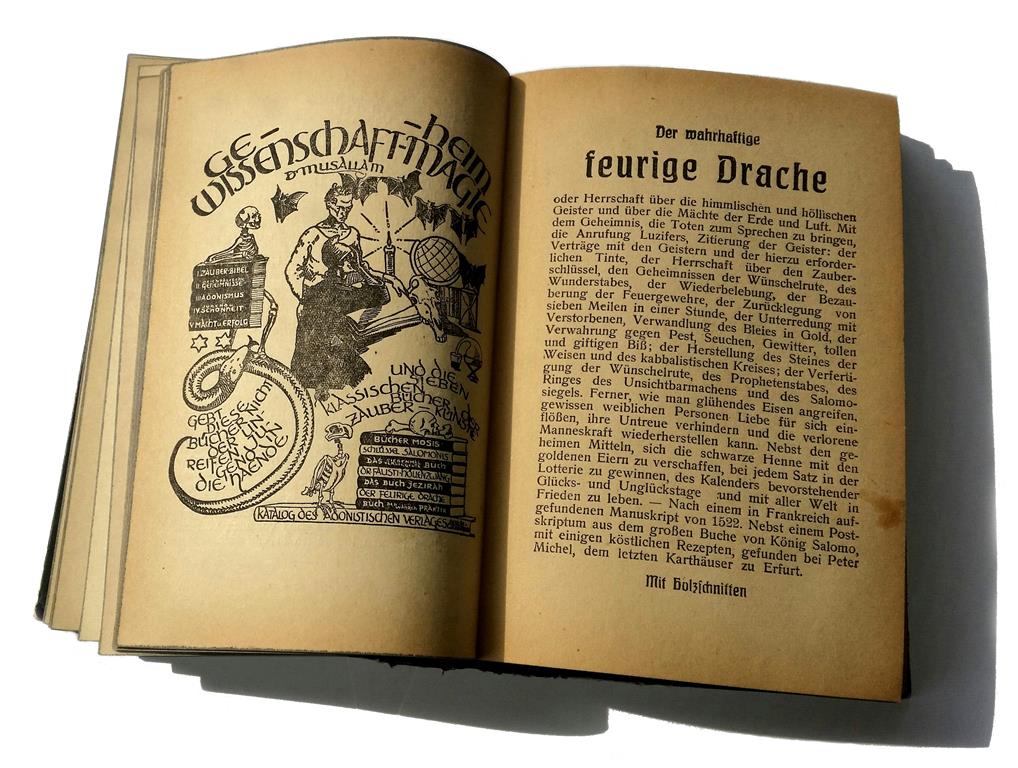
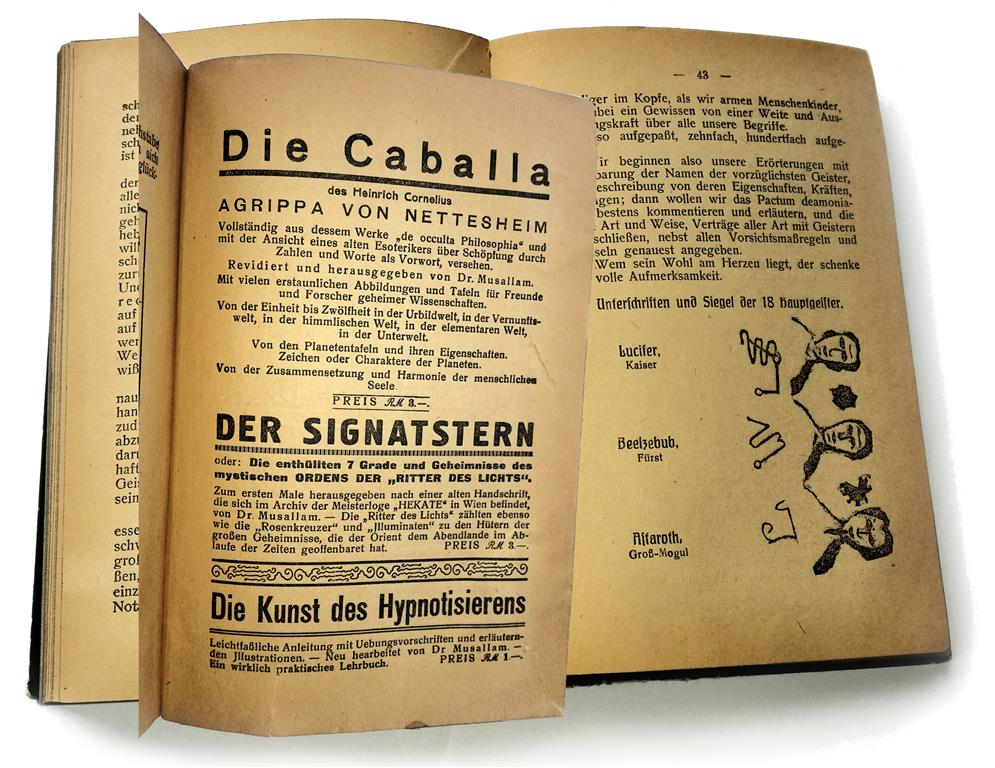
|
| Franz Sättler / Dr Musallam: "Der wahrhaftige feurige Drache". Lucifer, Beelzebub, Astaroth. Adonistischer Verlag. Advertisement: "Der Signatstern". No place and no date. |
Cont. SATURN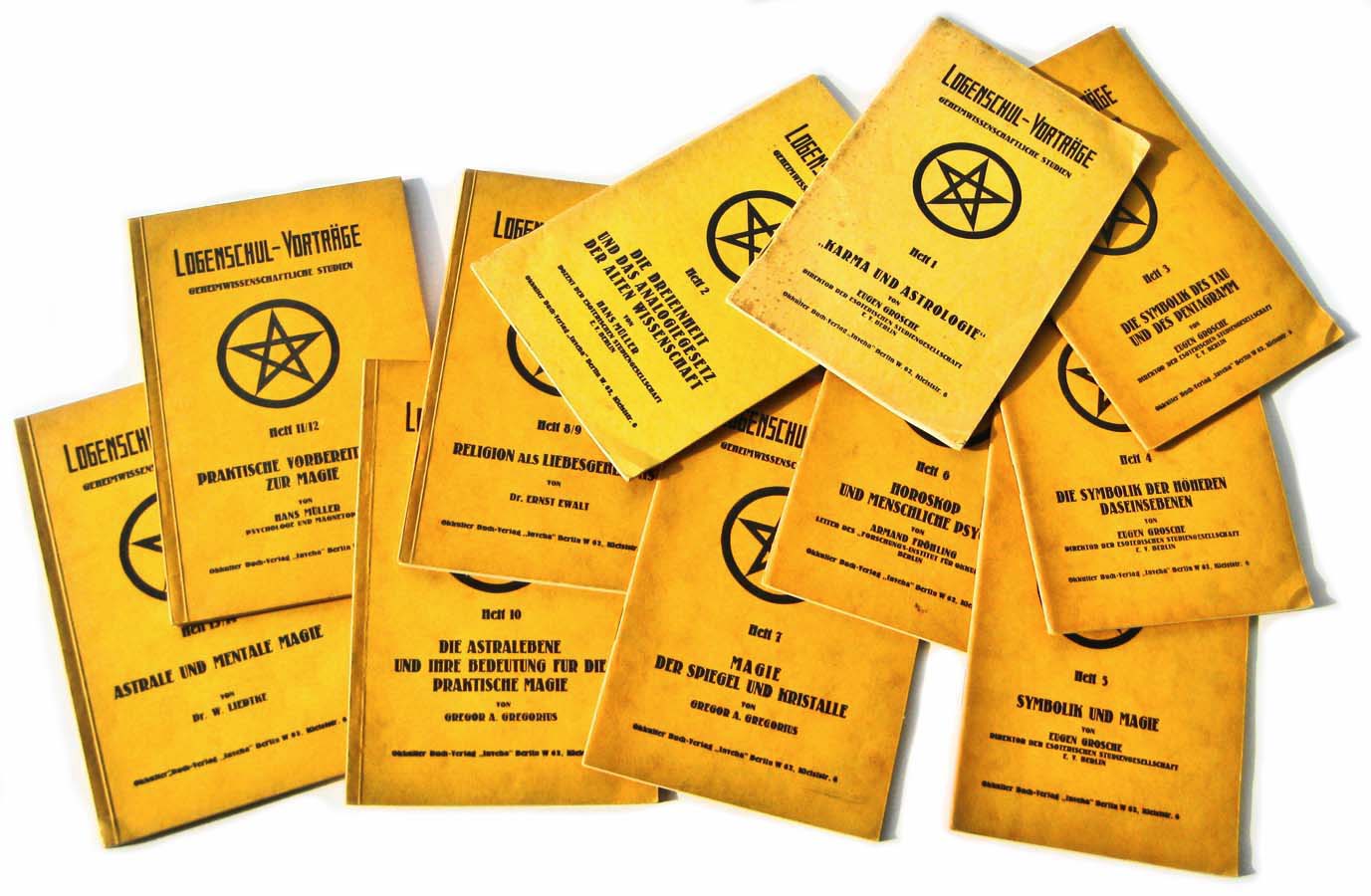
Rumours of drugs and sex in the FS were already spreading in the 1920's; there was the scandalous incident when a woman Saturnian fell off a bus while intoxicated with cocaine, as remembered by Oscar Schlag, who had visited Grosche in his bookshop [20]. And no wonder: Grosche's "Magical Newsletters" were clear enough about drugs - 'Lodge-School Discourse 7' informed its readers that extract of Peyote-cactus was available through the publishers, also enthusiastically advocating the use of hashish. [21] The "Berliner illustrierte Nachtausgabe" published a copiously illustrated article about Grosche's bookshop on December 8th 1928. A lecture held on October 8th 1929 expounded the theme of 'Homosexuality and Esotericism', while another on the 23rd of October was about 'Vampirism and Blood-Magic'. "A prominent member during the Weimar epoch was a Prince Coburg-Gotha, as well as the Countess Klinckowström". [22] In the same way as Henri Birven, 'Gregorius' published one of Crowley's writings through Martha Küntzel's 'Thelema-Verlags Gesellschaft Leipzig', this in fact being in the first volume of his five-part magazine "Saturn-Gnosis". The title page and text illustrations were provided by Albin Grau, who also contributed articles himself (one, for instance, on 'Hoene Wronski, 1776 - 1853'). Grau died on March 27th 1971, highly praised (but why?) by Metzger. [23] Frau Küntzel however, soon recognised Grosche for what he was: a "Black Brother". Grosche's one-sided correspondance with Crowley never got beyond the most general and superficial matters to do with lodge-business. [24] Frau Küntzel's printery in Zeulenroda only delivered the first two issues of Grosche's 'Lodge-School Discourses'. After October 1928, numbers three to fourteen, as well as "Saturn-Gnosis", were printed by Franz Weber. On October 10th 1929 Grosche was forced to dissolve his 'Esoteric Study Society' (the FS had made public its prospectuses and announcements under this title) temporarily using the name of 'Gnostic Study Society' [25]. Money problems compelled him to sell his bookshop to Paul Dörge, even including the lecture-hall at the rear of the premises. Grosche then allegedly set himself up in practice as a psychotherapist; it is not known why Crowley, on the occasion of his visit to Berlin in 1930, did not get in touch with him. [26] After his library was seized by the Gestapo in 1936, Grosche fled to Switzerland, where he visited Oscar Schlag in Zurich. [27] |
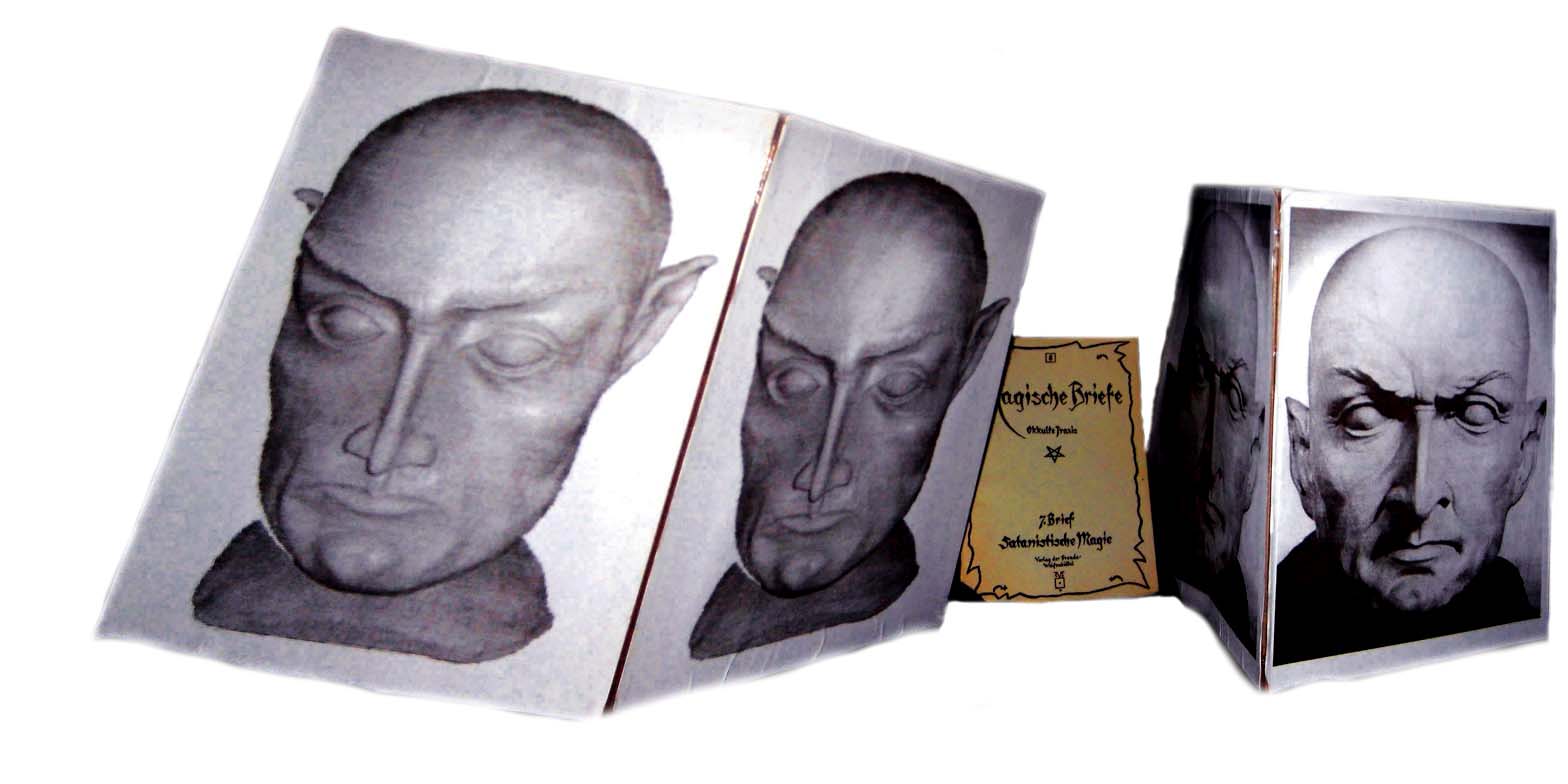
Saturn's Égrégore in sunny TicinoSome time in 1936 or 1937 Grosche turned up in the Ticino O.T.O. group associated with Genja Jantzen, Alice Sprengel and Frau Hardegger, [28] and apparently predicted to them when the Second World War would start. [29] His mistress Hannah Wildt stayed behind in Ticino until two years later when he got hold of a travel-permit for Italy. "In the vicinity of Cannero on Lago Maggiore (12 kilometres south of the border-town of Brissago), he lived in a small house close by the lake during his exile. He earned his living by working in the public gardens for the former Mayor of Cannero, Engineer Hencke. He occupied his leisure-hours with fishing." [30] Although his residence in Italy was permitted by the Foreign Ministry in Rome, in 1942 Grosche was expelled to Germany, where he became the manager of a bookshop. During 1942-3 'Gregorius' was a political prisoner in a Leipzig jail; of this, he later wrote: "Sonderführer Major Dr. Heinrich Fehsel had been appointed by the security service as an expert on all secret lodges... Through him I was freed from protective custody back, of course, to Leipzig once more. Of course, he'd been a lodger of mine for three years." [31] 
In 1945 he was given the job of constable by the Nazi police; nonetheless, he managed to escape from Dresden to Riesa-on-Elbe. After the war, he became a city councillor in Dresden, with a remit for culture, schools and museums. He had to join the Communist Party compulsorily, which put him under pressure owing to his esoteric activities; consequently he crossed to West Berlin in July 1950. Three years before, in January 1947, Karl Wedler "Giovanni" (b. 2.12.1911) became a member of the FS. [32] Some of the biographical details at the beginning of this chapter given without reference-numbers come partly from Wedler's essay on Grosche dating from circa 1957. [33] Friedrich Lekve, the former student of Martha Küntzel (d. 1942), described Grosche, C.S. Jones, and Mathers as "cancerous infections in the blood of spiritual giants" in a letter to Crowley dated April 29th 1946. Despite this, Metzger was given Grosche's address by Lekve, probably in early 1950, when the latter was on a trip to Germany. On May 14th 1950 Metzger "Paragranus, Peter Mano" started a lively exchange of letters with 'Gregorius'. Metzger offered to help Grosche, inviting him to Switzerland, while in his first response Grosche had already offered Metzger the publishing and author's rights to all FS publications. [34] As both of them wished to see a legal affiliation between all their esoteric groupings, Metzger accepted the offer of the leadership of the Swiss Lodge of the FS on June 10th 1950 [35]. Grosche found Metzger's ritual scheme for the 'Esoteric Study Association' (ESA), the preliminary 'outer court' "not magical enough", after which Metzger only alluded to his own O.T.O. rituals, making them available to the first candidates for advancement. Grosche could not even agree with Metzger's "Exertitions" [sic], because they were so similar to the "Magical Lections" of Karl Spiesberger "Eratus". Speisberger led a ten-member 'Metaphysical Study Circle'. "It's just as well that I've never been fond of pushing myself to the front," pronounced Metzger on September 7th, also referring to an alliance with the A.M.O.R.C.'s Grand Master, Martin Erler [36], back in Munich. According to Herr Erler's recollection in 1991, in fact Metzger and his women simply took the A.M.O.R.C.'s correspondence course; but Erler wanted nothing else to do with Metzger. [37] In response to an advertisement which Metzger placed in issue 19 of the periodical "Neues Europa" (dated October 1st 1950), Grosche received some 100 replies, which gained him 15 new students; they were answering the advertised "Invitation to entry into the Atrium of the Lodge". In all fifty students from West Berlin remained under Gregorius's tutelage; [38] which all in all contribute of 150 Westmarks (a month?) to pay off all his debts and give him something to live on. The Russian authorities were handing out prison sentences for those caught practising occultism, therefore only twenty students felt compelled in East Berlin [39]. Grosche was overjoyed at the "assembled men material." Grosche revealed his feelings to Metzger: "I will [...] always think of you as someone in whom I can place my trust, and I have the most profound sense that our paths could not have proceeded in so co-operative and harmonious a manner for such a long time, without our finding ourselves drawn closer together as men, friends, and brothers." [40] Metzger offered to write a history of the O.T.O., since he possessed a huge volume of material about it. [41] "Weida. Metzger has enormous amounts of material about this in filing-cabinets [...] But it mostly went on about Tränker, and his rapidly becoming doubtful of Crowley's integrity. More or less a case of doing his dirty washing in public." [42] Members of Metzger's Psychosophical Society received a new set of statutes on October 19th 1950; Grosche writing only one day after their enactment: "the warrant is extended for approaches and efforts in the realms of France and Italy." The foreign initiative was passed on to the Swiss Lodge, while Grosche occupied himself exclusively with Germany. With a visa for Austria and Germany, Metzger visited the brothers and sisters in 'the Valley of Austria, Orient of Vienna' in November 1950 and May 1951; they were under the leadership of Eduard Korbel, who had revived the Illuminati Order as an outer court for the FS, so as not to lose any of his members. Metzger had already travelled to Ticino in Switzerland in October 1950, in an effort to win over the surviving O.T.O. members from Reuss's era. One thing that Metzger had kept totally hidden from Grosche was that he had received a commission from Julius Meyer, the president of the 'World League of Illuminati' in Berlin, to act as a courier between Meyer, and Korbel in Vienna. [43] At the end of July 1950 Metzger also paid a visit on Tränker, who considered himself the successor of Theodor Reuss; this of course made him Metzger's "most serious rival". Tränker was kept in the dark about Metzger's association with the FS, because both Metzger and Grosche feared a court-case if Tränker wanted to seize their O.T.O. documents, which of course he was legally entitled to do as 'Supremum Sanctuarium' of the O.T.O.. [44] Against Tränker's claims, Grosche and Metzger discussed the idea of the O.T.O. becoming incorporated as the 18° of the 33-degree FS. [45] "Hence the Lodge [FS] takes precedence [over the O.T.O. in Germany] and Tränker cannot oppose it. As a legally incorporated association, it enjoys the protection of the law." [46] "Craft Masonry would come at the start of the FS in the three degrees, then the Pronaos or outer court degree would follow, and in the Pentalphae degree the said O.T.O. would be worked, etc. - the O.T.O. degrees have always included Craft Masonry - such Brothers and Sisters could eventually get the Mercury grade simultaneously - or could they pass through in some special way?" [47] From the Adonists (who were, it seems, often closely concerned with "erotic questions") Metzger (who went under the alias of 'Servius' among them) was able "to learn something, especially as far as organisation was concerned." From a certain unnamed Adonist professor, Metzger "learnt one day a week for two years, in an intensive way, about humanistic education and scientific theories, to degree level." [48] Both Metzger and Grosche were placing themselves in a position to swallow up other groups, whether it be the Adonists or Lekve's 'Thelem Chassidim'. Lekve was open-handed where promulgating Thelema was concerned, and regularly sent copies of the "Thelemic Lections" out to all interested parties, even to the hated Grosche. "We have to suck off the weaks, or achieve leadership under organisational control... to become the Spiritus Rector who sets the pace" Grosche emphasised bluntly on November 3rd 1950. Suddenly Metzger put the correspondence on the back burner. Grosche found himself in "terrible financial straits." Many of his students had yet again "bailed out", and his final immigration papers for Berlin had been delayed because of the city's council elections. "What's wrong with you? Are you really ill?" implored Grosche on March 14th 1951, to Switzerland. What has happened? Metzger had bought a printing-press (Akzidenz-Druck, Psychosophical Institute Press), and had made international contacts "with South and Central America, as well as France". The fourth organisational report of the FS, which was now written and printed by Metzger, gave Metzger's box-number as its contact address for Europe, on Grosche's advice. [49] In the Swiss group were: Brother 'Perdurabo', Brother 'Cubus', Brother 'Johannes', Brother 'Dore Rubes Giraga', Sister 'Agatha', Sister 'Rhodanuba' (Frau Werder-Binder), Sister 'Ainyahita' (Frau Borgert), and Sister 'Mechala', (Frau Metzger). On March 25th 1951 the FS-O.T.O. in Germany stated its position as follows: "We now have an effective outer court of the FS in Germany, in Switzerland the ESA and the O.T.O., and in Austria the Illuminati Lodge, all as atria to the FS." The FS was the umbrella-order whereby only tried and tested brothers and sisters could enter the O.T.O. through the 18°. The FS was intended to be the heir to esoteric leadership, with Metzger providing the means and creating the relationships. Whereas in Berlin high-powered magic in theory and practice was the order of the day, the Swiss Lodge was working towards other ends, taking up much less controversial studies such as "Rhetoric, the psychology of success, introspection, and the study of the [psychic?] centres, about the machine-man, self-recollection, unity, and the great problem, ritual esotericism." Metzger had also prepared the first three tasks the students were supposed to perform: "Essay on the personification of a so-called dead object; daily records of solitary meditations; relaxation exercises." The Swiss held their monthly meetings after 1945 in the 'Aula Paracelsus'. [50] Metzger hoped that 'Gregorius' would be able to take care of the Reuss-Crowley inheritance (especially both men's correspondence) with his authority as Supremum Sanctuarium; it was then in the possession of Frau Jantzen at Ticino who "claimed to be sole heir and highest authority of the O.T.O.". But Frau Jantzen had no copies of the Order's rituals, and she called for help on a certain Frau Bader in Wesel, who possessed the V°. Frau Bader's daughter Gundula had been married to William Fischer, a member of Metzger's group, and had been "in due course the cause of our split". Oscar Schlag mentioned Gundula's father Dr. Wolf Bader, of Öhningen am Untersee (later of Freiburg in Breissgau), who likewise maintained that he was 'the' O.T.O.. [51] 'Gregorius' advised Metzger to "put Tränker off" this trail initially, and then to use go-betweens to "get up close to Jantzen and Frau Hardegger." As a go-between, Grosche had thought of his ex-mistress Hanne Wildt, who had now become Frau Hardegger's secretary. [52] Of course, he couldn't operate as Supremum Sanctuarium himself, as these ladies knew him only in his status as a "simple brother of the O.T.O.". Thus Grosche gave Metzger advice on March 22nd 1951, on how the latter should overrun the Jantzen circle, because "anyone who gets publicised and published is strengthened." After the dissolution of Pinkus's and Sprengel's original Zurich O.T.O. group in 1947, Frau Gundula Bader returned its documents to Frau Jantzen, who was Frau Sprengel's legal heiress. After 1972 when Frau Bader's letters to Jantzen "received no more replies, I had to assume that" Frau Jantzen was no longer alive. [53] At the time of writing, her Order materials have still not been returned to Stein. [54] Grosche's difficulties with the occupying powers in Berlin left him prey to a "battle with the Spirit [...] far worse than you in Switzerland can conceive!" He went on: "Every day it gets worse, and the enemy pays us even more attention. War is inevitable; you can count on it in any case - you'll just have to cope with it as best you can!" Metzger remained unmoved; his letter in reply to these strictures covered seven pages, without once mentioning Grosche's worries. Metzger was in any case far more interested in printing and publishing and esoteric tittle-tattle, than bothering with Grosche's worries and the political fortunes of Berlin. |
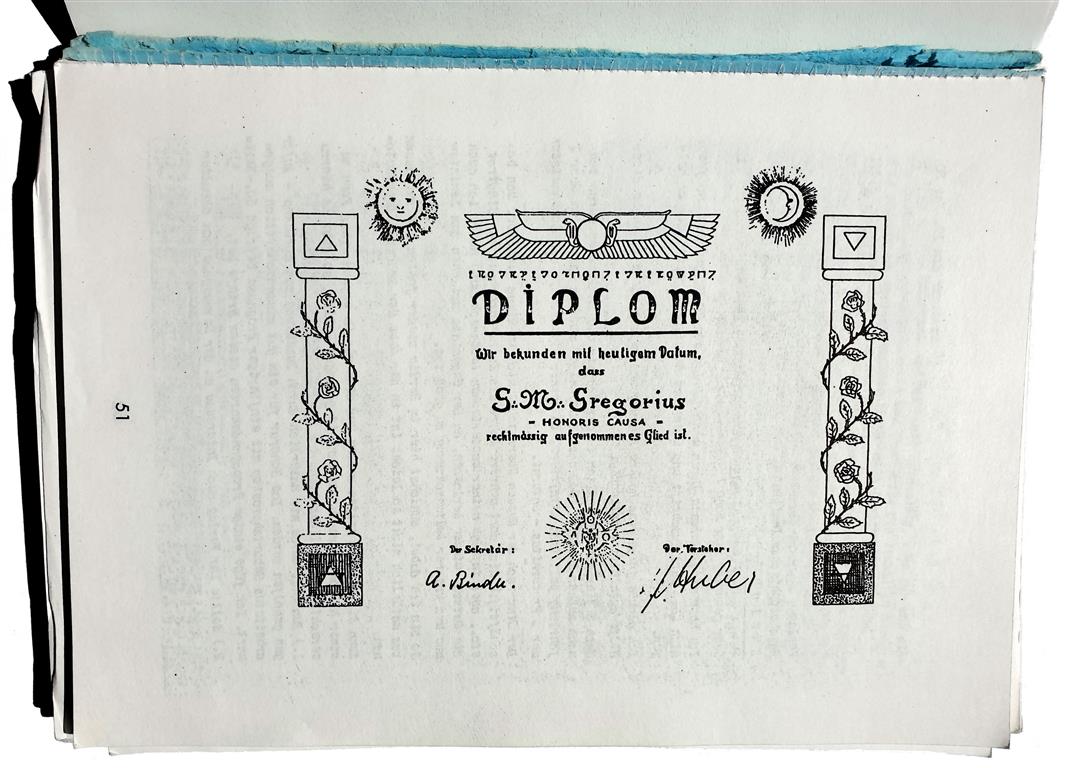
|
"The circle is complete" indicated Metzger cryptically on April
25th 1951, forwarding a charter to Grosche: "It's a genuine O. Charter,
which Tränker hasn't got." He was probably referring to an extant,
but very insignificant-looking diploma which was worded: "We declare
on this date that S.M. Gregorius = Honoris Causa = is officially appointed
a member." [55] Written in code-letters on the diploma is the
following motto: "Truth is the sixth wisdom." [Signed by Anna Binder and Charles Huber.]
The code was "'written in the cipher of the 'Templar priests'. This cipher was discovered in the papers of the theosophist J.C. von Wöllner (1732-1800), and was repeatedly made public under the title of "The Signat-Star".' [56] In using the cipher, Metzger only compounded his errors by demonstrating that he'd actually only HALF used the system and even managed to muddle it with another Masonic script." [57] By return of post, Grosche forwarded a corresponding Charter and included a "Warrant to establish an Atrium of the Fraternitas Saturni Lodge in the whole territory of Helvetia." [58] "I'm putting myself right behind you," Grosche thanked him [59] and went on to stress his great hope, that with the publication of his novel, a Penny Dreadful titled "Exorial" - which Metzger promised to undertake - he would be able to escape his money-troubles. "As it is, we've hit on a really rotten patch - no cash for the rent." Grosche wrote; he was counting on Exorial selling about 70,000 copies, while a second novel "Das Dunkle Licht" ("The Dark Light") also promised to sell well. [60] 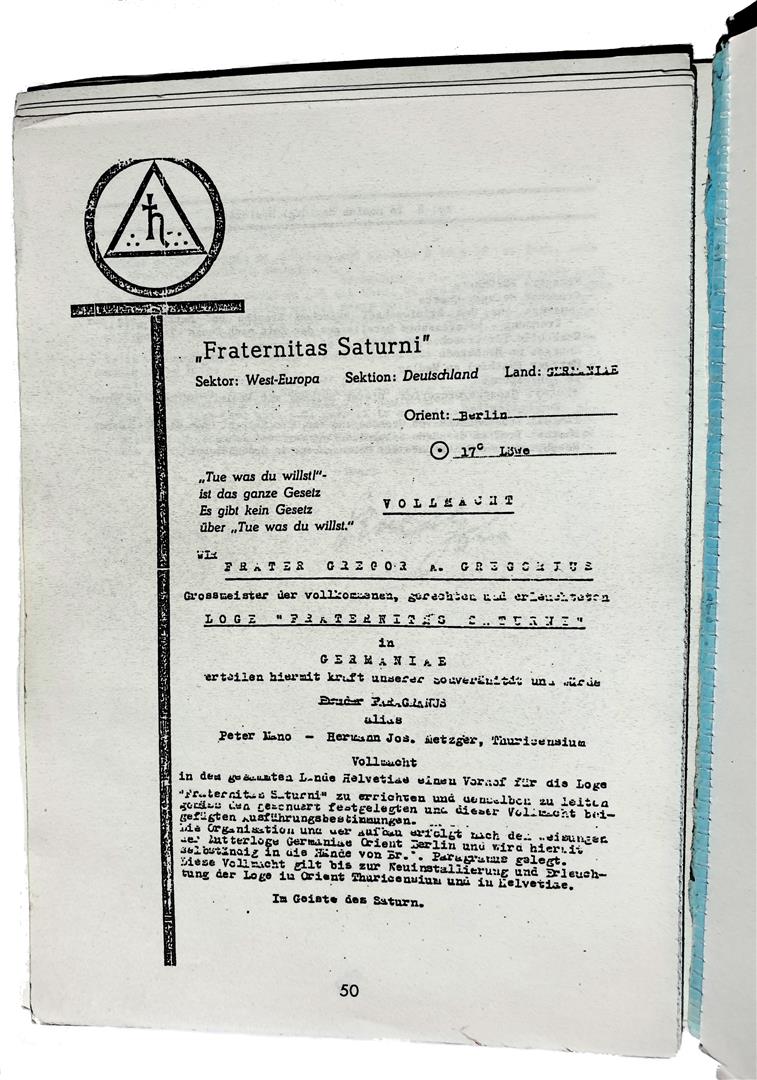
Contact with Karl Germer at lastIn June 1951 Metzger made himself known for the first time to Karl Germer's Crowleyan O.T.O., representing himself as the successor to the group at Monte-Verità, and mentioning "Pinkus" and "Fräulein A. Sprengel" to make the best possible impression on Germer. [61] Metzger made absolutely no mention of Hilfiker (most likely because he never knew about Hilfiker's rôle), and took good care to craftily conceal Fräulein Sprengel's first name Alice. [62] Thus Germer naturally mistook her for the mysterious (and probably fictional) Fräulein ANNA Sprengel, who of course had been such a decisive factor in the founding of the Golden Dawn. [63] In this light, Metzger looked to be "so far genuine, with true aspiration, and cautious in things which he may be sworn to keep silent from uninitiates [sic]." Filled with enthusiasm, Germer reported to his European deputy Friedrich Mellinger that Metzger's group had a "printing shop of their own", instructing Mellinger to choose Crowley texts for Metzger to publish. "If my optimism is not based on sand, but solid, we should have been given a very promising connection." [64] "If Metzger would have had access to all of A.C.'s works in the way [Kenneth] Grant has had, I'd be inclined to see in him a parallel case. However - like Grant - there seems to be the lack of money." [65] Encouraged by Germer about the Thelemic cause's chances of international success, Metzger was now belabouring his association with the FS; Germer was still full of aversion for Grosche: "He was a sex-maniac, dabbled in hypnosis and drugs." [66] Grosche "surely is a child of Tränker's." [67] "I also heard that Grosche [...] has started O!T!O!-Lodge activities again. I do not know from whom he can claim authority: perhaps from Tränker. Metzger should know about that..." pondered Germer, still being kept in the dark. [68] Obviously Germer took the FS for an O.T.O. Lodge. On May 5th, June 6th, and July 22nd 1951, Grosche was complaining about missing letters from Switzerland, whence Metzger was now writing (on July 27th 1951) under a new letter-heading: "Today on the 89th Anniversary of our Order" [69]. He noted that they finally had an individual O.T.O. temple [70] and that contact had been taken up with the OHO (Germer), still without having any FS rituals, which meant that the O.T.O. brethren were hardly likely to be suited to the FS's practices - could Grosche provide even more FS member's addresses?, and whether it was now possible to send the MS. of "Das Dunkle Licht" to Switzerland for publication. Grosche was perplexed. "On the organisational relationship between the FS and the O.T.O., we have surely determined that the local O.T.O. should become a part of the grade-structure of the corresponding FS - !! - of course the FS doesn't even exist there officially, meaning it isn't yet up and running" [in Switzerland]. He continued: "You can enlighten Vienna about my mandate - of course to a certain extent it's Switzerland that takes over Vienna's sponsorship." Grosche apruptly tried to push Metzger into a scheme: "a way we could make some money [...] on the Therion model: selling high degrees! - it's not very congenial to me, but it would work." The "Blätter" now said of the O.T.O.: "this organisation's system is also found within the Fraternitas Saturni." "Dear friend and Brother [...] in the O.T.O. it is planned to re-integrate the entire knowledge of the secret fraternities, and to render them effective - you must understand me!" Metzger explained his stand-point on July 30th 1951, fearing a protest from the regular Freemasons; he also asked Grosche again to send him his list of contact addresses. Grosche, though, did not understand: "When does the FS begin working in Zurich? When does O.T.O. workings in Zurich start as degree-workings of the F.S.?" [71] On the strength of this Metzger explained vaguely that he was "filled with sorrow" about a "unified lineage", and spoke obscurely about an idea which would have generated publicity. [72] He was possibly referring to an article in Quick magazine (issue 37 of 1950) about hypnosis, which talks about Crowley in negative terms. On September 3rd 1951 Metzger arrived home from a trip to Germany, and demanded that Grosche return the Charter of April 25th to him: "It has of course become apparent that the matter in question was an extremely critical and fundamental mistake." This was the last letter that Metzger ever wrote to Grosche. In October 1951, during Metzger's visit to Friedrich Lekve and Friedrich Mellinger, he went to see Grosche in Berlin, together with Fräulein Äschbach. There is no clue about what happened at this meeting in Grosche's subsequent one-sided correspondence. Having got hold of so many foreign addresses for the FS, Metzger had set himself up in opposition to Grosche, getting to know many of the members personally. He profited shamelessly from Grosche's wide knowledge of the esoteric scene, and knew all about his financial position, his hopes and ambitions. The two manuscripts of Grosche's novels, which had been meant to give him an income, were never returned by Metzger. Grosche's threats to bring the Swiss Union of Authors to bear on the matter were ignored. Grosche wrote angrily to Metzger: "Hitherto, I had held you to be an honourable and upright man, on whom I could implicitly rely [...] I can only shake my head over you [...] I openly say it into your face: you should be ashamed of your behaviour towards me!" [73] Despite this, the O.T.O. in Germany stayed anchored to the FS: "The Symbol of the Tau [on the carpet of the Fraternitas Saturni Lodge] is the sign that the secret Order of the O.T.O. is firmly established as a Degree in the Lodge, insofar as it is worked as the Gradus Pentagrammatus [Pentalphae]." [74] At this time Grosche asked Arnoldo Krumm-Heller's son to join the FS - but in vain. [75] Between 1951 and 1953 the following people had O.T.O. certificates signed by Germer (or sometimes Mellinger): Metzger, Annemarie Äschbach, Anita Borgert, Georges Berard, Josef Haniman, Rösli Metzger, Irene Weber, Othmar Weber, and Anna Binder. On September 11th 1953 Metzger was expelled from the FS "due to disreputable behaviour", and his "Warrant for Switzerland" was annulled. [76] 
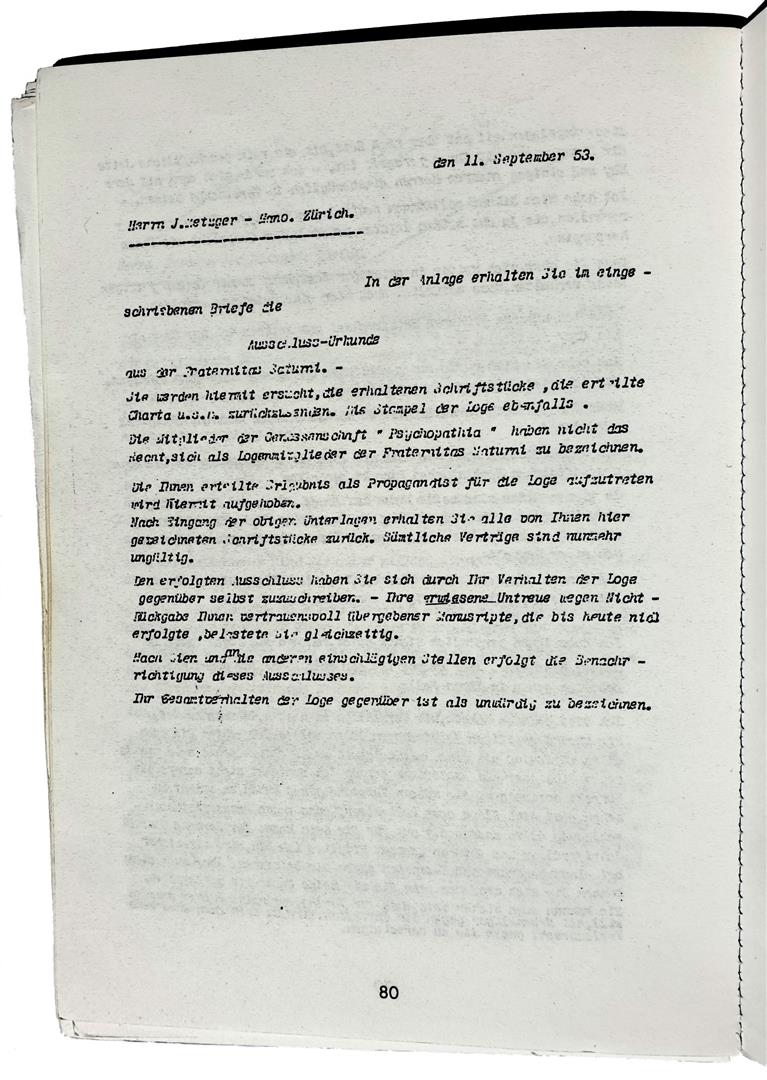
Grosche: "The members of the 'Psychopathia' association [sic] have no right to describe themselves as Lodge members of the Fraternitas Saturni." [77] "This so-called umbrella-organisation [...] does not exist any more [...] The so-called O.T.O. Alliance in Switzerland is nothing but a pipe-dream of Metzger [...] and not genuine." [78] 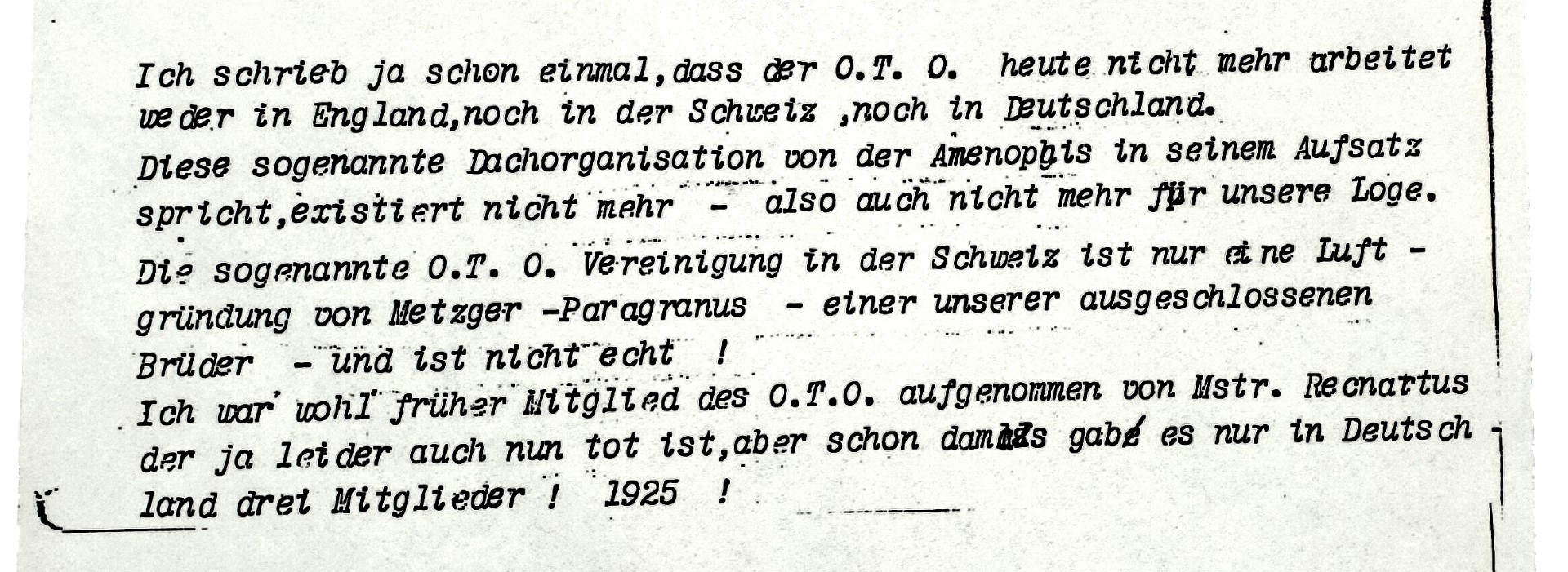
Eugen Grosche to Walter Englert, 23 October, 1962. 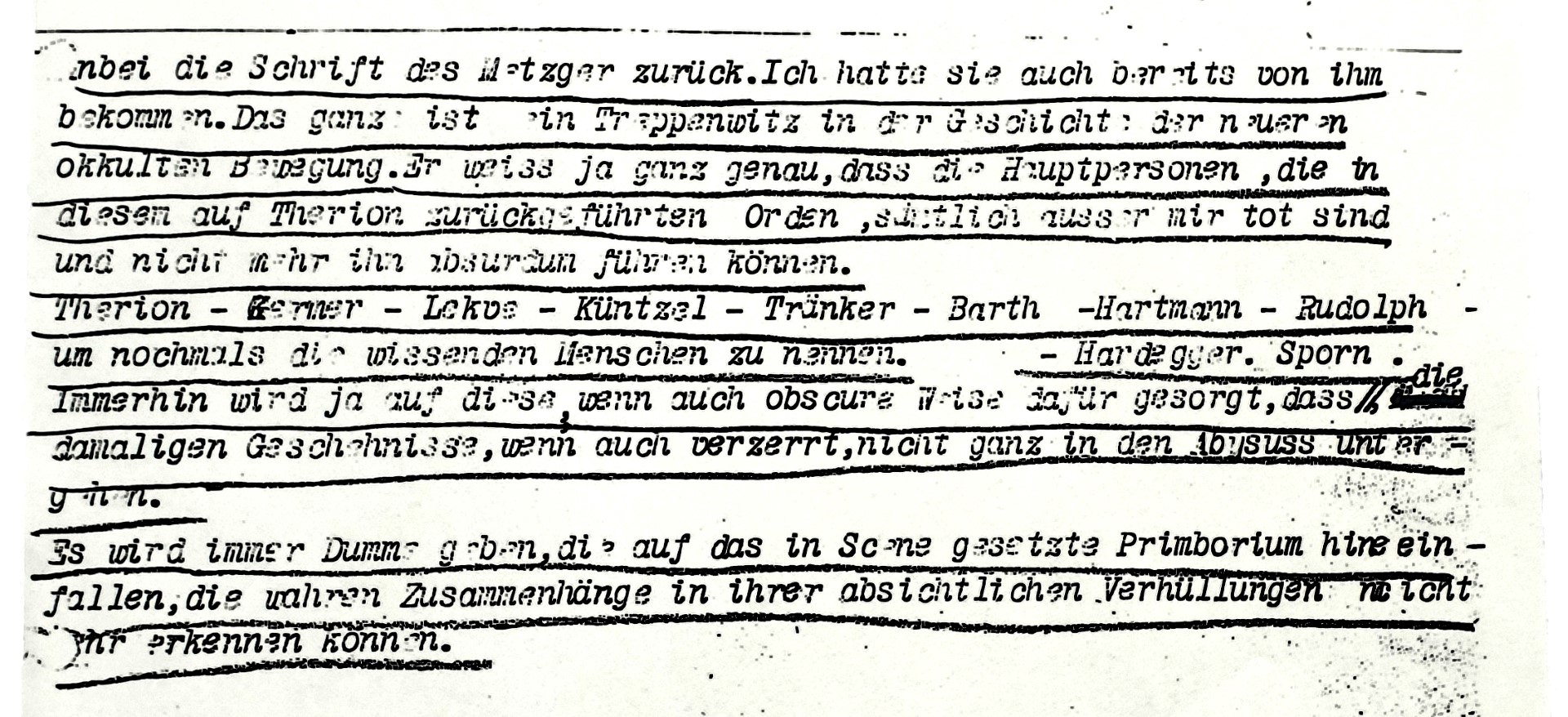
Eugen Grosche to Walter Englert, 27 March, 1963. When she was asked on January 7th 1987, whether Metzger became Master of the Fraternitas Saturni's 'Orient Thuricensium', Fräulein Äschbach's reply was short and sweet: "Ach Chabis!" which could be roughly translated as "Oh rubbish!". But between 1951 and 1953 Sister Äschbach "Chochmah" is regularly mentioned in the FS's records as "ritually" being "sent good harmonic mental energies". Kenneth Grant: the Typhonian O.T.O. in EnglandIn 1945 Crowley furnished Gerald Brousseau Gardner (13.6.1884 - 12.2.1964) from England, who was already a IV° and P.I., with an O.T.O. warrant "to constitute a camp [...] in the degree Minerval". But Gardner had no time to spare for the O.T.O., due to his leadership of the Wiccan order (under which title he had organised his synthetic modern revival of witchcraft). [79] Crowley mused about Grant who had contacted him in 1944, in his diary during March 1946: "Value of Grant: if I die or go to U.S.A, there must be a trained man to take care of English the O.T.O." [80] In the autumn of 1950 Grosche made contact with Grant, [81] while on May 5th 1951 Germer sent Grant an O.T.O. charter "to constitute a camp" after Crowley's death, saying "if we want to get the O.T.O. properly going again, we need a competent leader, not only for England but for the whole world. It must be somebody who knows the thing inside out: [...] I have often thought that you might will be chosen for the job." [82] Grant was a protégé of Friedrich Mellinger, and received his O.T.O. Lodge instruction from W.T. Smith. 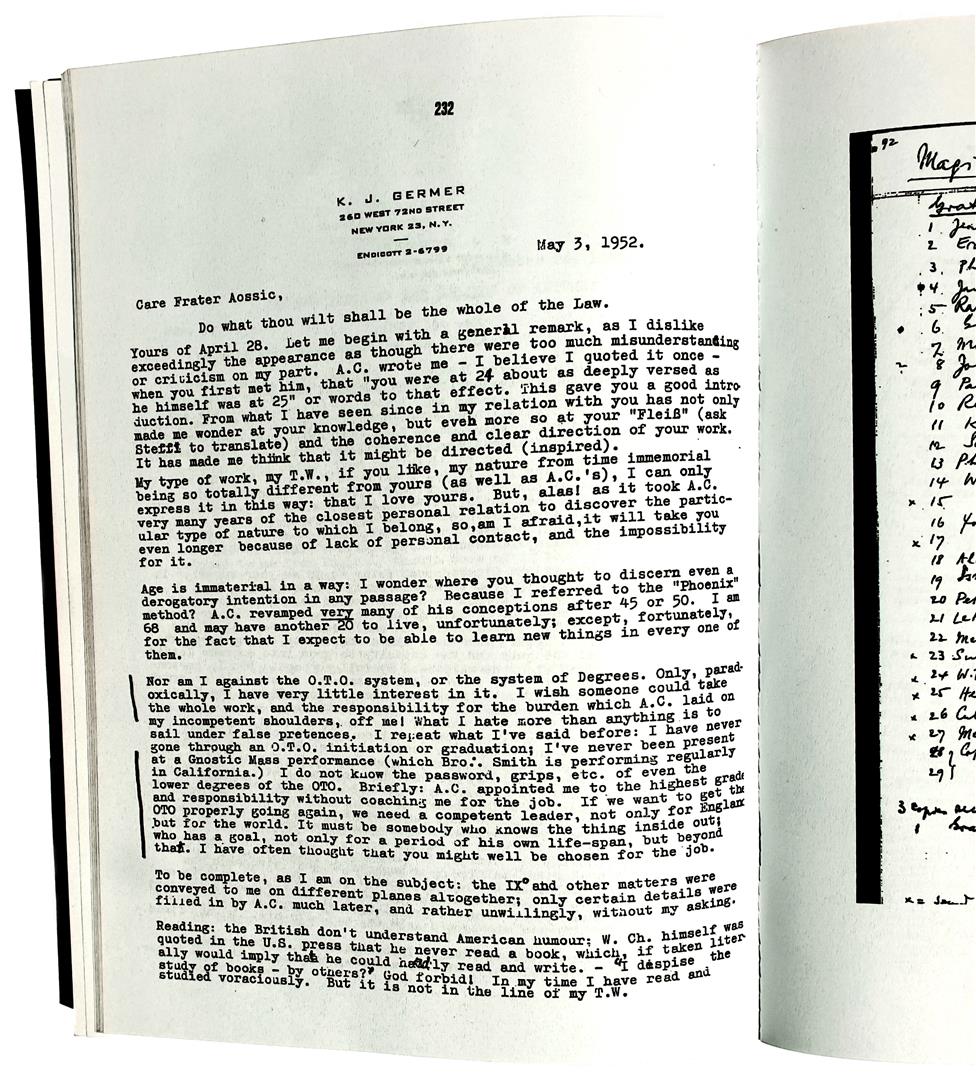
In October 1954 Grosche reprinted Karl Germer's German translation of Crowley's "Little Essays Towards Truth", which had first appeared in "Saturn Gnosis" during 1928. [83] As a result of the appearance of Grant's 1955 "Manifesto" for his 'New Isis Lodge', on page 6 of which Grosche was mentioned, [84] Grosche himself published an abbreviated German version of the "Manifesto" in April the same year; this caused an extreme reaction from Germer who "took violent exception to my [Grant's] referring to Grosche", [85] and consequently ejected Grant from the Crowleyan O.T.O. on July 20th. On August 20th Germer prohibited Grosche from publishing any more of Crowley's writings. Germer "had a long-standing feud with Grosche," [86] which indeed dated from the era of Pansophy, despite the fact that Germer had chosen exactly the same planet for his 'Order Name' or magical motto, as Grosche's adherents. In this dispute the decisive factor was that Metzger not only accused Grosche of stealing the manuscript of the "Gnostic Mass" from him, [87] but also that Grosche's "Sonderdruck 1" ("Special Edition 1") of January 1955 spoke of the more or less sexual character of the "Mass". In March there followed "Sonderdruck 2", with an account of Crowley's visit to Weida, and the consequent founding of the FS. At this time too, articles were flowing from Grosche's pen on the association of astrological aspects with "Coitus-positions". Grant's "pleasant correspondence with Herr Metzger" was terminated as a result of these arguments. [88] On the 16th of December Germer appointed a certain Edward Noel Fitzgerald as his "personal representative in matters of the O.T.O. for Great Britain."; though Germer cautiously added a postscript that this document was "valid until revoked". Fitzgerald had compiled the bibliographical appendix on 'The Works of Aleister Crowley' in Richard Cammell's biography "Aleister Crowley". [89] Is it possible that Germer who accepted Grant as IX°, can expell members from the Sovereign Sanctuary of the Gnosis? [90] After Germer's death in 1962 Grant's 'New Isis Lodge' ceased its activities [91] and Grant promptly called himself OHO. The authorisation for this had, according to one source, come to Grant through a kind of "laying on of hands" in 1945. [92] Saturnian TurmoilAlthough being disappointed in Metzger, Grosche was still determined to put the Order's affairs in somebody's hands: "I have thought over our personal conversation once again, and would ask that at some stage, you would write me a brief account which would clarify the utterly impenetrable state of the secret orders, starting with the A.A., through the G.D. and the R.C. up to the present time; it should include a clear listing of people like Germer, Lekve, Paragranus, Tränker and Fritsche etc. [these last three names in longhand] Dr. Peters[en?] etc., put in their rightful places and effectively knocked off their pedestals. Everything in Germany will have to started again from scratch, and it would be quite right that, as regards you yourself and Switzerland, or even better concerning South America, it should all be renewed under your leadership." Thus Grosche wrote to Oscar R. Schlag on April 4th 1956. The next month, Tränker died. 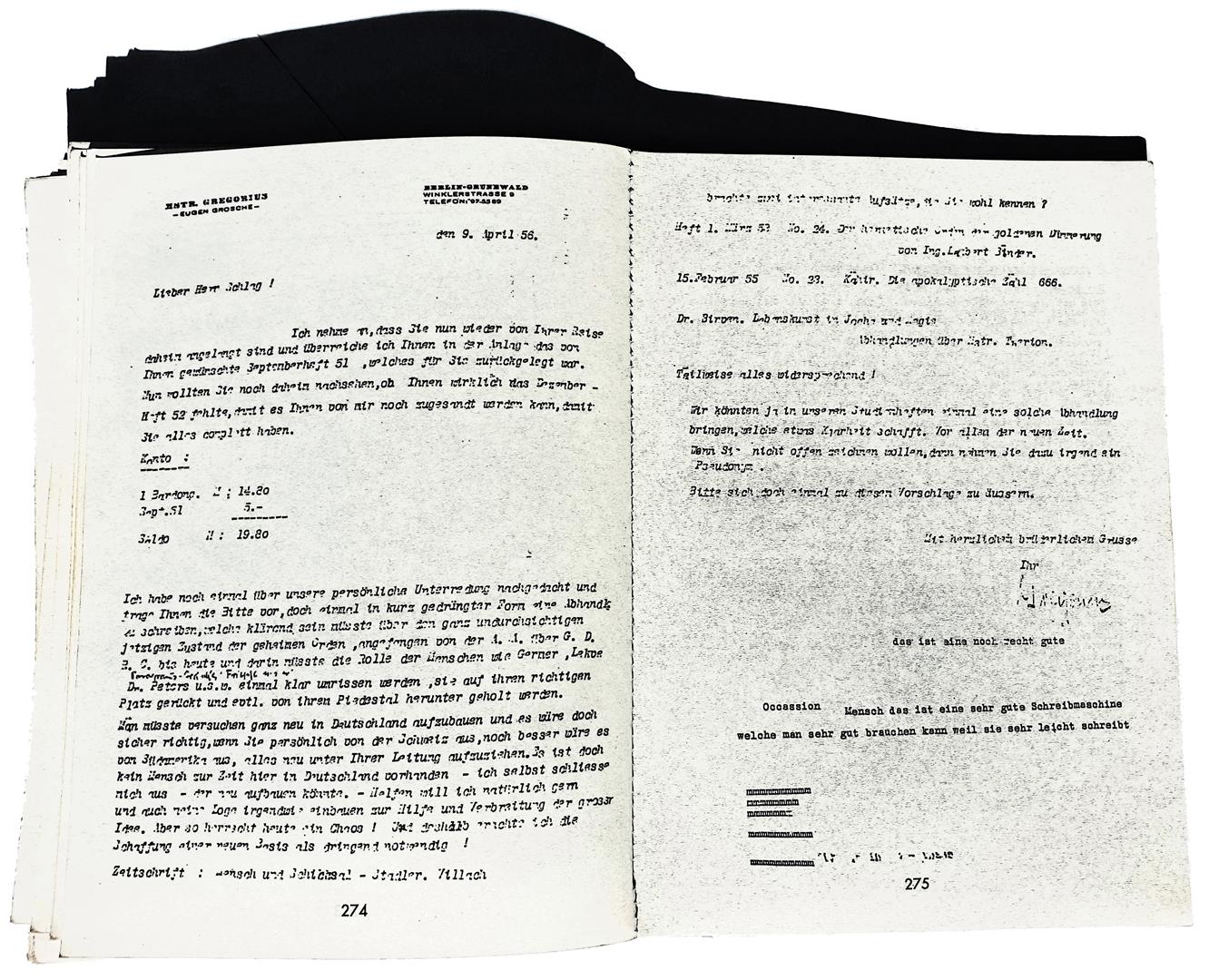
Eugen Grosche to Oscar Schlag: "...it should all be renewed under your leadership..." [From "Materialien Zum O.T.O."] In August 1956 Grosche gleaned information that Germer and Lekve were promoting Crowley's interests in the USA and Germany respectively. He said that Lekve had "only just then distanced himself, and sent his resignation to Dr. Petersen in Hamburg. In Switzerland a certain Herr Metzger founded an Abbey of Thelema in agreement with Germer." Hence "it is therfore certain that at the moment in West Germany neither Therion's A.A., nor the Order of the G.D., nor the O.T.O. are officially operative." [93] That September Grosche went on his usual holiday to northern Italy, staying in the hamlet of Cannero on Lake Maggiore near the Swiss border - where he had lived for four years from 1942 as a refugee. 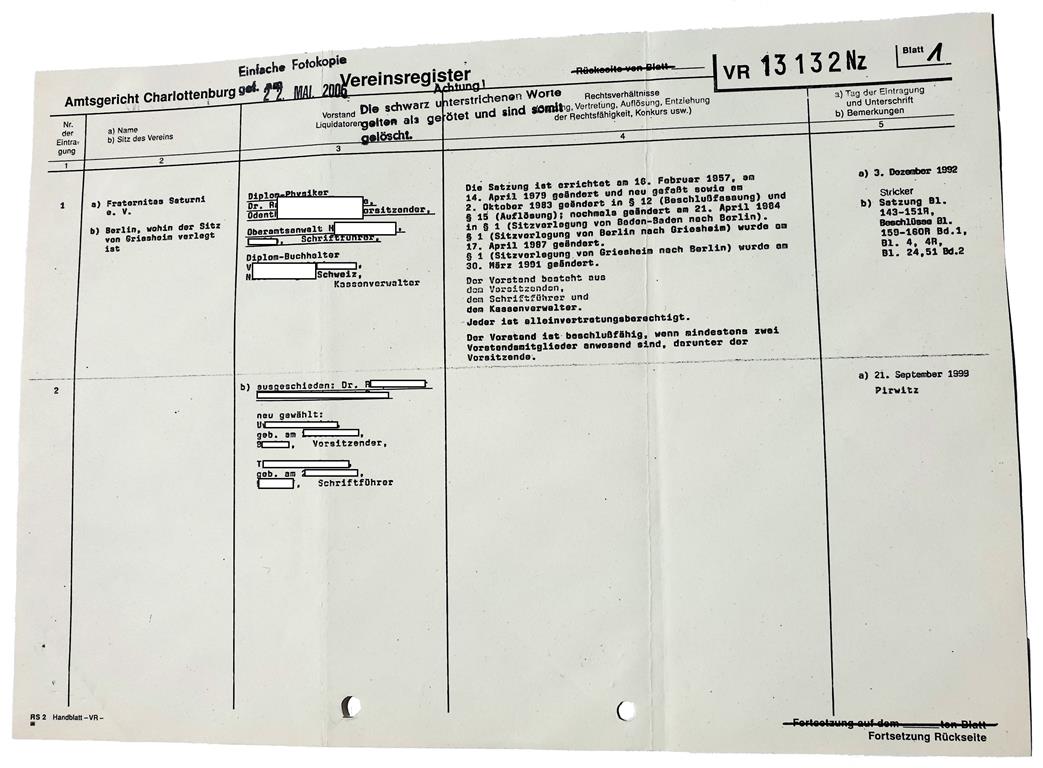
On March 18th 1957, the 'Grand Lodge of the Fraternitas Saturni in Berlin' was officially registered with the authorities as an association (the statute was established on February 16th]. [94] In December of that year Grosche defined his position: "The O.T.O. is not an umbrella-organisation for the FS Lodge, but is instead to be viewed as a wholly independent international body which is, as it were, behind most of the recognised secret Lodges - without being linked to them organisationally. In Germany the Order is not officially active," [95] - hardly surprising, as Tränker was already dead. It is not clear why Grosche makes no mention here of Hjalmar Vollkammer's [96] Metzgerite O.T.O. 'Prometheus' Lodge in Bonn. According to Adolf Hemberger, Vollkammer had been at the head of an 'Ordo Illuminatorum Germaniae' since 1956. [97] Vollkammer published an article in the first number of Metzger's "Oriflamme" in 1961, but appears to have broken away from Metzger after about March 1965. Grosche: "The Brethren of the FS Lodge are not Thelemites [...] Their stubborn literal-mindedness is in our opinion worth nothing. The strengthening magical and cosmic influence of this Age demands a flexible adaptation and application of Therion's teachings." [98] In October 1958 Grosche annulled Karl Wedler's offices as Area and District Master of Wattenschied (Wedler had become a Frater in 1954, and Master in 1957) appointing him instead as Archivist of the Grand Lodge. [99] |
| In March 1960 Grosche finally managed get his novel "Exorial" published. "G[rosche] assured me that everything in "Exorial" really happened." [100] By Easter Grosche had been raised to the 33° in his own Order, the highest degree called Gotos: Gradus Ordo Templi Orientis Saturni, signifying a personal identification with GOTOS or Baphomet, the Lodge's tutelary spirit. On July 22nd 1961 Mount Ipf was ritually placed "under Pan's guardianship"; but rumour has it that another ritual in 1962 saw the FS formally dissolved. [101] | 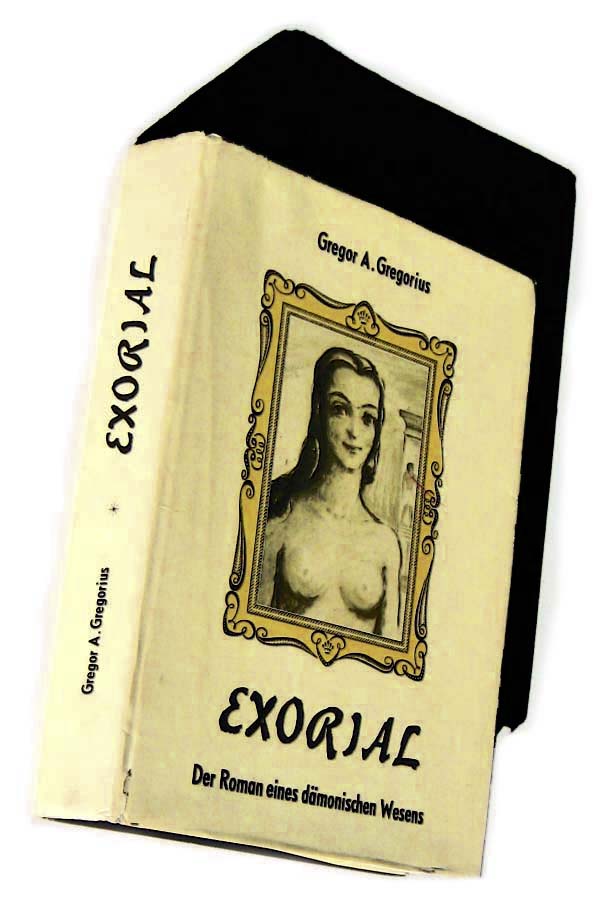
|
|
When Metzger proclaimed himself OHO of the
O.T.O. in January 1963, Grosche viewed it as "a footnote in history as far as the new occult
movements are concerned." [102]
On September 21st Gregorius's lieutenant and Grand Inspector Margarete Berndt "Roxane", [103] together with Karl Wedler and Winfried Künnicke "Fried" (who had travelled from New York, and been a member since 1954), met up with Grosche on his annual break at Lake Maggiore, where they all vowed to continue with the Fraternitas Saturni. En route to this meeting they visited Walter Englert, Johannes Göggelmann, and Willi Hauser (a member since 1954). The 'Luminis' lodge of the FS in Frankfurt existed since 1962 under the leadership of Johannes Maikowski "Immanuel" (18°, 22°, a member since 1955), [104] and his wife Irmtraud "Flita" (16°); together with Herbert Alfred "Johannes", and Walter Englert "Ptahotep" (18°), while other members had the mottoes 'Manfred' and 'Sara'. Englert and Maikowski, who were both 18°, wanted to respond to Grosche alone, bypassing Wedler. Grosche said of this: "Mstr. Ptahotep is certainly being pushed along by his own blatant and strong ambition." [105] Maikowski founded his own FS in 1963, and registered it with the authorities in Frankfurt as an incorporated association; its inner order was called 'Fraternitas Luminis Ordo Regina Adeptorum' or FLORA for short. Among other members was Adolf Hemberger, but it seems that in FLORA "everybody wanted to play the part of Grand Master." [106] The disputes among these adepti had started in over a photocopier, which had been purchased without Wedler's permission; later on a court ruling was obtained: "Establishing a Lodge under the same name elsewhere cannot be prevented. Also legal incorporation of an association is no hindrance. Section 57, Paragraph II of the Civil Code is unambiguous [...] from which it automatically results that it is not possible to protect a name in Germany." [107] |
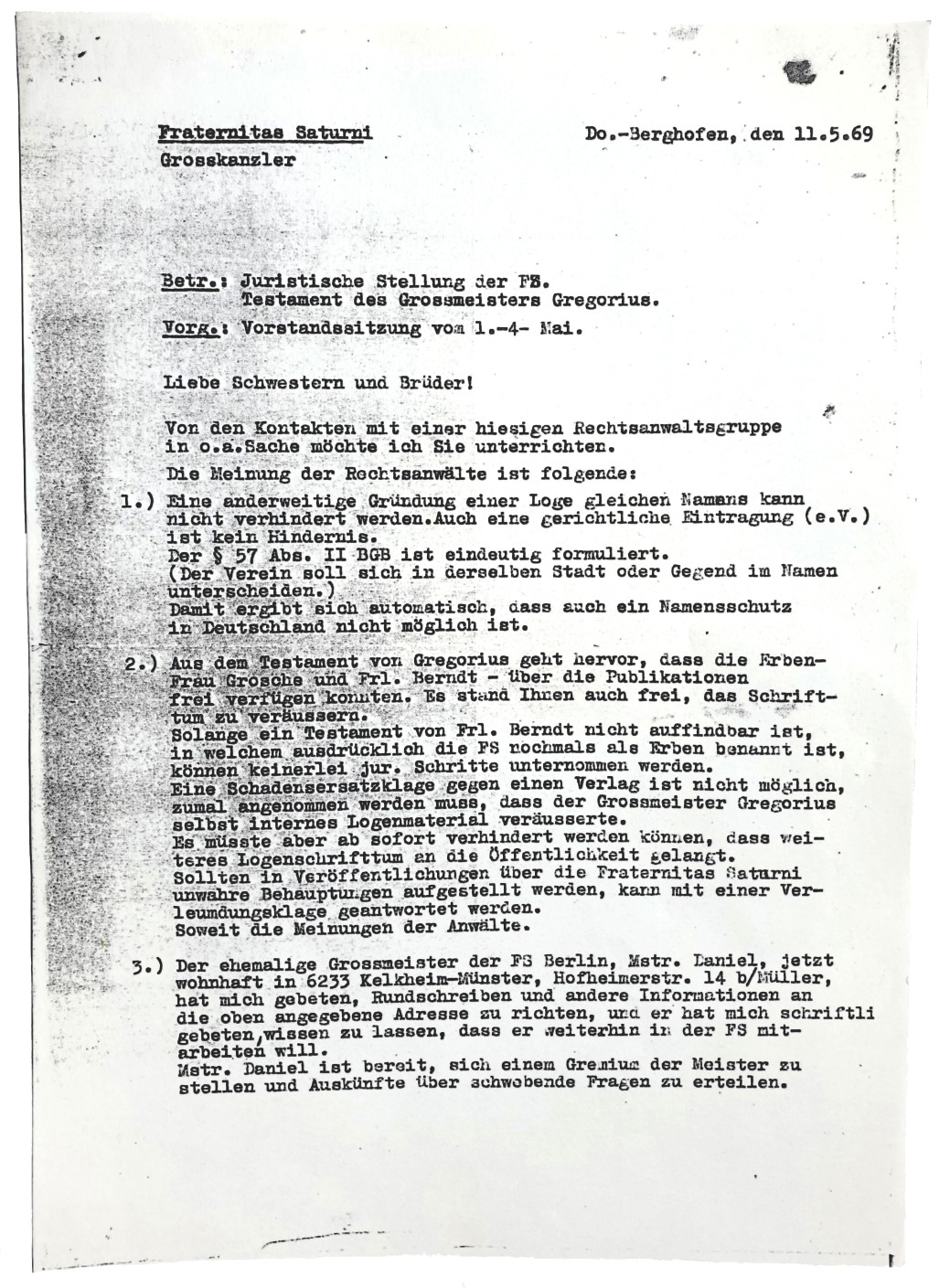
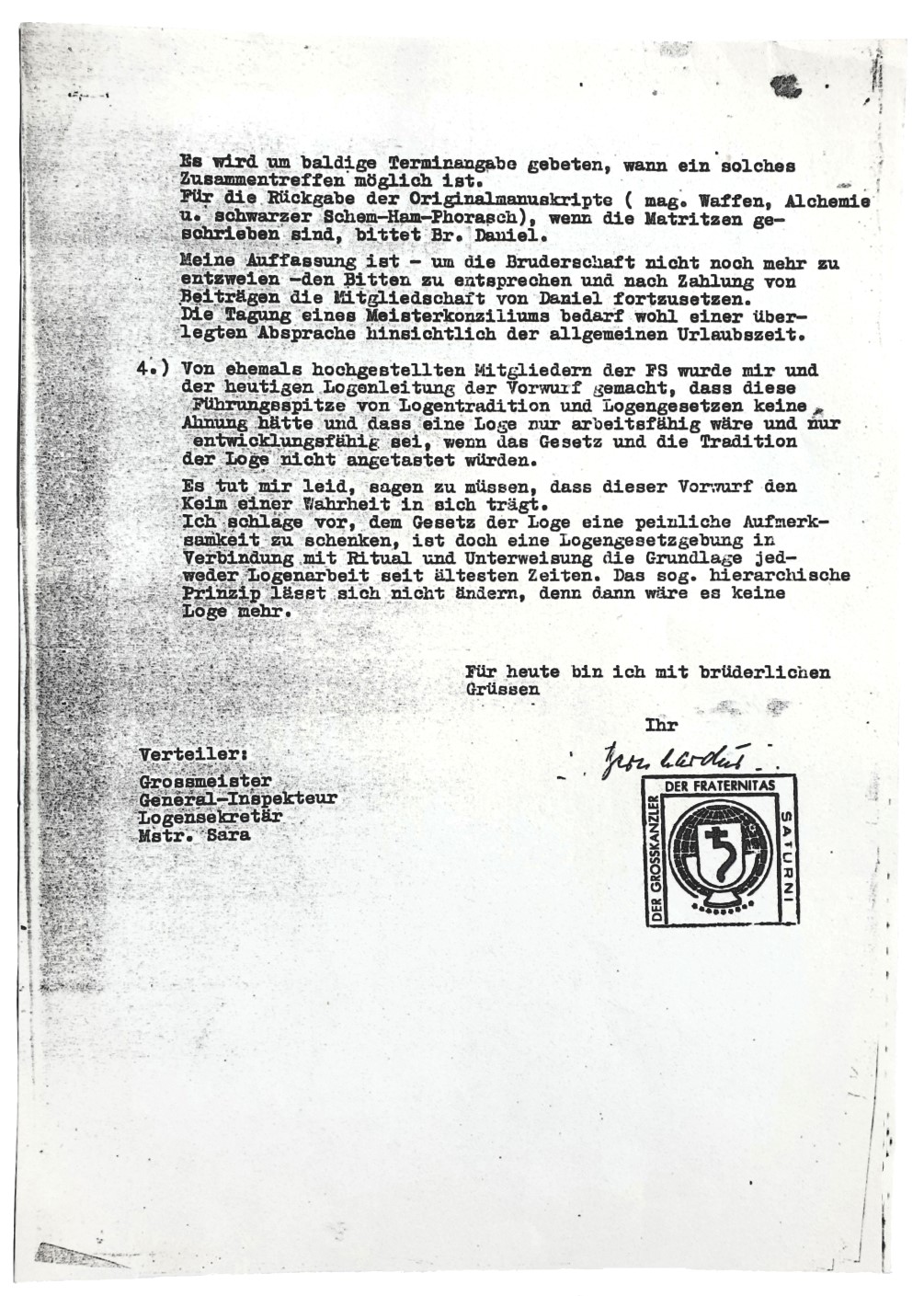
Egregor deadGrosche died of a heart-attack on January 5th 1964 aged 76. His official obituary was written by Marie Grosche, together with Alraune and Hans Bölke; he was buried at the Waldfriedhof at Zehlendorf in Berlin. Grosche's widow had never shown much interest in the FS, and closed her husband's antiquarian bookshop. Born on February 23rd 1888, Frau Grosche herself died on May 14th 1967, and was buried by her husband's side; the grave was dissolved in 1989. [108] | ![Eugen Grosche [Gregor A. Gregorius] Fraternitas Saturni In Nomine Demiurgi Homunculi](https://www.parareligion.ch/2010/homunc/2.jpg)
|
|
On March 2nd 1964 Metzger informed 'Roxane' that as "mother order of
all Thelemic movements [...] guarding the literary heritage of
the Master Therion [...] we must show the way and be careful of
misunderstandings." To that end he had the "authorisation, the
foundations, and the proof."
Metzger complained about the "theft of spiritual properties"; the front cover of a leaflet for Grosche's antiquarian bookshop showed a picture whose original was at Stein. He was possibly referring to a picture by an artist called Kelling on the advertising prospectus for Grosche's novel "Exorial"; the dust-jacket of the book itself was designed by Martha Funk. Although Metzger never returned the manuscript of this "story of a demonic being" to Grosche, Grosche nonetheless managed to publish the work himself in 1960 at Berlin. [109] At the Easter meeting of the FS Lodge held from the 28th-30th March 1964, 'Roxane' was enthroned as "Grand Mistress" through a secret ballot. [110] In September 1964 the Lodge's publication was changed from the cumbersome "Blätter für angewandte okkulte Lebenskunst" to "Vita Gnosis"; from May 1965 its name was once more revised to "Saturn Gnosis". 'Roxane', born on July 9th 1920, began to fall ill in September 1964; after just 14 weeks in the office of Grand Mistress, she was having to be nursed by Wedler's wife, and died on June 8th 1965. After Frau Berndt's death, Karl Wedler (33°), Hermann Wagner "Arminius" (27°), and Willi Hauser "Fabian" (16°) formed themselves into a 'Triumvirate' in charge of the FS; as a 33°, however, Wedler had the final say. Metzger wants to take overOn July 19th 1965 Wedler received a letter from Metzger, who wanted "this small vessel, the ashes of the Order of Saturnian Brothers, to return to its native shores" because "our last OHO [Germer] committed us all to a special duty though the years, to study with, and secretly look after this movement." Metzger sent Wedler a warrant for the V° on approval; but the latter was not "bribed" (as he termed it) by this, and later on the warrant was cancelled. [111] The 'Triumvirate' apparently failed to keep in proper touch with each other because they lived too far apart, and so most of the Order's work ended up being concentrated in Wedler's hands. At the Easter Lodge meeting on April 8th-10th 1966, Wedler's protégé, a chemist called Guido Wolther from Kelkheim (12°, a member since March 1964) [112] was elected Grand Master. [113] On April 13th 1968 two further 18° were appointed: Emil Forrer "Domani", and Hans Bühler "Heliobas". Within the FS a new secret inner Order was now born: the 'Ancient and Mystical Order of the Saturn Brotherhood', or AMOS; [114] on September 10th 1968 Wedler, as the Order's 'Gotos', became "Honorary Master of the AMOS." [115] In the mundane world Wedler manifested himself as Chief Inspector of Restaurants for the local health authority in Bochum. [116] |
Adolf HembergerAlthough they both denied it, [117] it was Guido Wolther 'Daniel' (18°, 33°) who removed documents from the archive for Adolf Hemberger, who compiled them and published them in dozens of small volumes, and gave shape to current perceptions of the FS. One 18° ritual full of blood and semen roused strong feelings when made public, [118] while many of 'Daniel's' sex-magical drawings and writings did the rounds. [119] "Hemberger really styles himself as a student of Fra[ter] Saturnius [Johannes Göggelmann], and an X° member of the O.T.O." [120] | 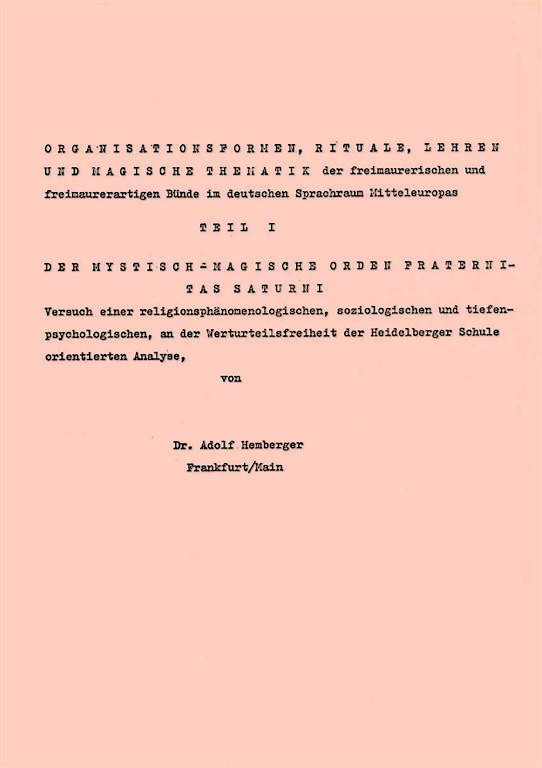
|
|
Metzger found it necessary at this stage to send out circular letters
in which he declared: "Grosche was neither a member nor a brother of
the O.T.O., or the Illuminati." Hemberger, whose opinions derived
from Walter Englert, countered this with: "the legitimate heir of Crowley
in Germany can [...] only be the FS." [121] Wolther was
likewise linked with Englert's officially incorporated IO/O.T.O. in Frankfurt. [122]
During the Lodge's Easter assembly on April 5th-6th 1969, members who had seceded from the Frankfurt FS (though without Englert and his IO/O.T.O.), united themselves once more with the Mother-Lodge. Wedler enthroned the new Grand Master of the "United Grand Lodge Fraternitas Saturni": [123] Walter Jantschik "Jananda" (born November 9th 1939, 4°, 8°), who had been a member since April 1964. [124] Jantschik, who was a civil servant in the Ministry of Justice, wished to found an esoteric university within the FS, which would confer qualifications of Doctor and Professor to those submitting a dissertation. [125] A year after his appointment, Jantschik was ritually initiated into the 18° with 'Roxane', 'Orpheus', and 'Arminius' present. [126] No documents have been written for either Jantschik's 18° initiation, or his nomination as Grand Master. [127] Jantschik recalled: "I have not received a document in which Metzger wanted to take over the FS" during his leadership of the FS [128] "Daniel left the FS about 1969; there were difficulties with the Lodge's secretary under 'Giovanni's' leadership, and he had problems with his wife 'Rahel' [Myriam Wolther]. A certain Brother Heliobas [see above] from Australia had his eye on his wife and seduced her." [129] On February 18th 1971 'Daniel' permanently resigned his office as 'Gotos' of the secessionist faction of the Frankfurt FS; the concomitant quarrels and denunciations to the police were recorded by Hemberger in his series on the FS. [130] With Wolther's departure the AMOS ceased to exist. Jantschik was quickly followed as Grand Master in 1969 by the Pole S.W. Wicha, who had entered the Order the same year. Jantschik recalled: "Before I abdicated from the office of Grand Master: there was lots of plotting on all sides, etc. Giovanni wanted to be appointed as an honorary member, as did his wife [...] Since I left the FS in 1970-71 I have had no further contact with this Lodge." [131] Jantschik divorced his first wife in 1971, and married a younger woman (born June 6th 1953) from Mauritius; it has been recorded that the return flights cost about 5,000 deutschmarks. At the Easter meeting of the Lodge for 1977, in his absence "Andrzey was unanimously voted out of his position, because of his neglect of his office." The new Grand Master was called Joachim Müller "Horus", [132] who died on May 25th 1982. [133] In 1978 the Canadian branch of the FS publicised its own address in a 'Caliphate' newsletter [134], after which its manifesto appeared in the magazine of the Maat group in Ohio, [135] while in 1990 S. Edred Flowers, a follower of the 'Temple of Set', published a compilation of Friedrich-Wilhelm Haack and Hemberger's writings under his own name. [136] In Nomine BaphometiOn May 6th 1970 Paul-Günther Diefenthal who was a member of the FS, shot Walter Jantschik's brother-in-law Josef Göttler, seemingly following the "orders of Baphomet". [137] In the course of investigating these matters, the journalist Horst Knaut and F.W. Haack, (who was chief delegate of the Evangelical Church with responsibility for sects and ideologies since 1969), succeeded in visiting Jantschik in his home at Lehrberg on March 22nd 1974. Knaut feared that Jantschik would try to perform a cult-sacrifice with his as yet unborn child, and sent some of his writings off to be analysed by a psychologist, suspecting "danger to soul, love, and life." [138] Knaut was amazed that he was not taken seriously, even after he had exposed Guido Wolther in "Quick" magazine and elsewhere, and deliberately threatened Wolther with legal action if he interfered with his work as a journalist. [139] Wolther wrote enraged letters to Quick and Haack, in which he denounced Jantschik. [140] The latter defended himself: "What Wolther says of myself [...] beggars description." [141] Jantschik, as a member of the Metzgerite Order of Illuminati since March 18th 1965, studied the pertinent teachings as published in the "Oriflamme"; but the contact with Stein fell into abeyance soon after. He claimed "I was a member of the IO for approximately three years. The transmission of material was then suspended (reason: organisational grounds)." [142] "I visited Metzger in his Abbey at Christmas 1970, and thereby also made the acquaintance of Frau Borgert and Fräulein Äschbach, as well as their magical son[Simon]. Metzger proved to have three equal vocations: psychologist, businessman, and author. He also told me that he had fathered many (magical?) children, or that was how I understood him. Besides this he informed me that he was the legal authority in charge of the O.T.O.-Order of Illuminati, &c." [143] Jantschik's interests broadened, and he became a member of the A.M.O.R.C., the Goden Order, Josef Grasser's "Stephanios" 'Loge Kether' in Paris, and AMOOKOS - under the alias of 'Aythos' he wrote a booklet about the FS published in 1979, in F.W. Haack's collection of documents. [144] Within the O.T.O.A he wrote under the initials 'CCD' in 1983, while in 1981 he had at first been Brother 'Antomedon', and later on used the title 'Levum' in the Ordo Saturni, and as a member of Michael Aquino's 'Temple of Set'. [145] Before this in 1980, Jantschik had been a co-founder of the German branch of the 'Caliphate', where there were members of the Temple of Set - and formerly Scientologists as well. By 1989, now using the alias 'CIT', he became 'Baphometor' in the Ordo Baphometis, and by the end of that year resigned from all the aforementioned orders, thenceforward focused on his OB only [146] The Ordo SaturniIn 1971 Oswald Schrey "Aton" from Berlin founded the 'Antares Study-Group'. Through adverts in the occult periodical "Esotera" some twenty-five members were recruited, among them Jürgen Gisselmann "Merlin", who seems to have made himself very popular by referring to his relationship with the self-styled Satanist Ulla von Bernus, and the FS. [147] Gisselmann "was very active at that time, and introduced Herr [Dieter] Heikaus to the Study Group." [148] Heikaus "Phosphorus" was "appointed to membership of the new Triumvirate" by Gisselmann, which made Schrey feel he had been ignored; Heikaus and Gisselmann were excommunicated. "All members distanced" themselves from both men, [149] and the Antares group became defunct in 1973. [150] Under Andrzey's leadership a "Magna Charta" of the Fraternitas Saturni was published on March 31st 1972, in which the associated 'Ordo Saturni' was announced as the associated body of the Fraternitas Saturni. But the Lodge Council of the FS, meeting on October 27th 1978, agreed "that the 'Magna Charta' and the Ordo Saturni linked to it are not binding on the whole Lodge, and that it, [the 'Magna Charta'] through its challenge to the jurisdiction of the present G[rand] M[aster], contradicts the Lodge's laws (see Sections 1, 11, and 101)." Dr. Conrad "Drakon" the Grand Master, declared the 'Ordo Saturni' to be non-existant. [151] Dieter Heikaus, now calling himself 'Honorius', who had supposedly completed his studies in theology and teaching, [152] was however working as a "secondary school teacher of German, history, English, and religion" [153] and took charge of the Lodge's publications. [154] By 1978, the local Orient in Bersenbrück was seeking independence from the Fraternitas Saturni, and Heikaus sought out supporters for this idea among the membership. In January 1980 the Orient, now called 'Ordo Saturni', celebrated its ritual inauguration as an independent Grand Lodge ruled by 'Honorius', now 'Set-Horus'. This new Ordo Saturni (OS) was not a continuation of the previously associated body of the same name, but instead a kind of outer court for the 'Order of Set', which was itself hidden as an inner order of the OS. Continual changes to its statutes have recently led it to conclude that "those workings and Degree workings that are submitted [...] are the property of the Ordo Saturni." [155] 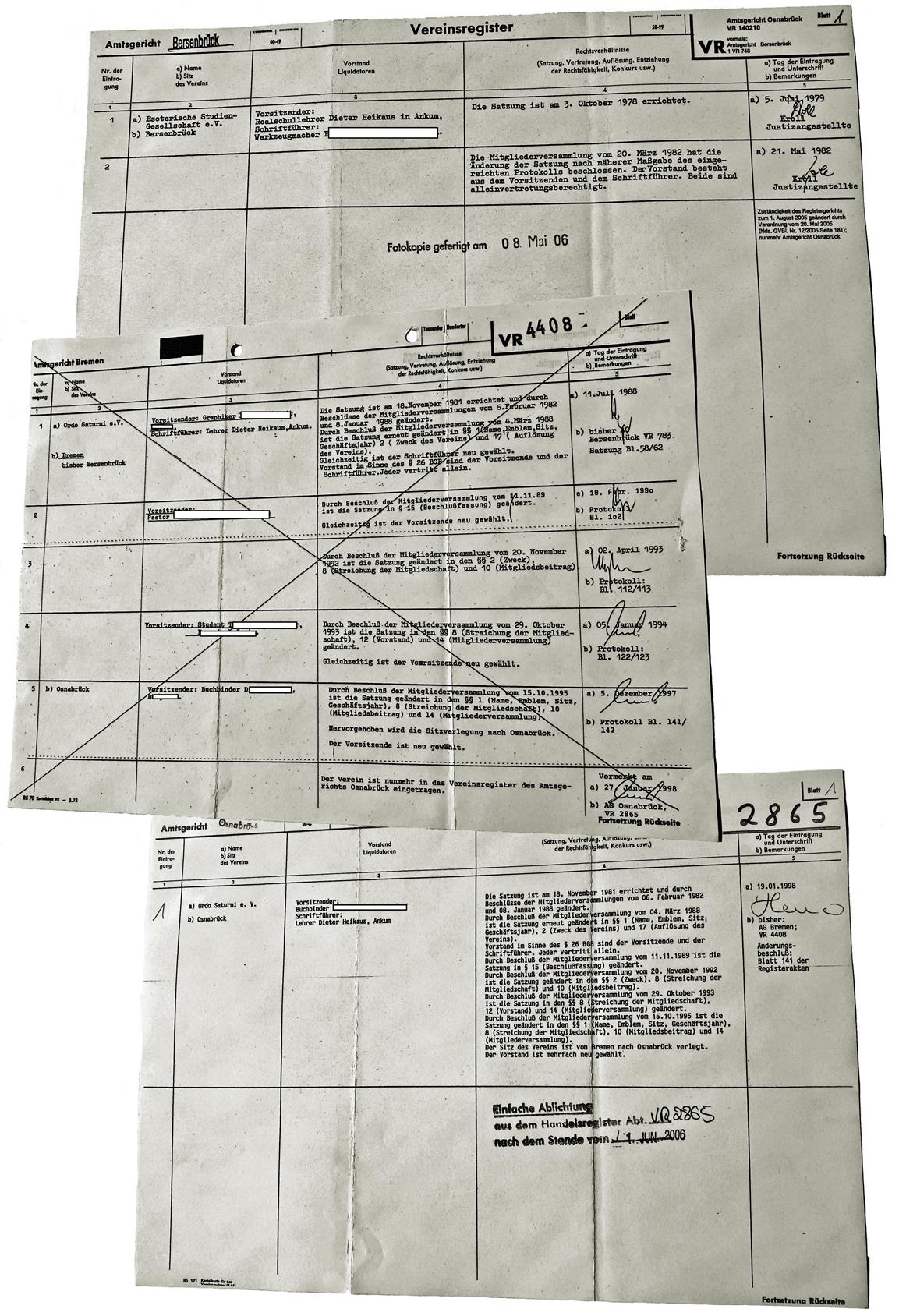
In 1985 the OS was advertising itself with the lamen of the O.T.O.; at the same address bodies such as the Gnostic Catholic Church, the 'Pentalpha Tantra Circle' seeking 'Ladies and Gentlemen'; [156] the 18° Pentalpha Circle - also more bluntly labelled a 'Sex-Magic Study Group' - held its meetings on the Lodge's premises. [157] However, Heikaus advertised himself with a "Special Department for Ariosophy." [158] 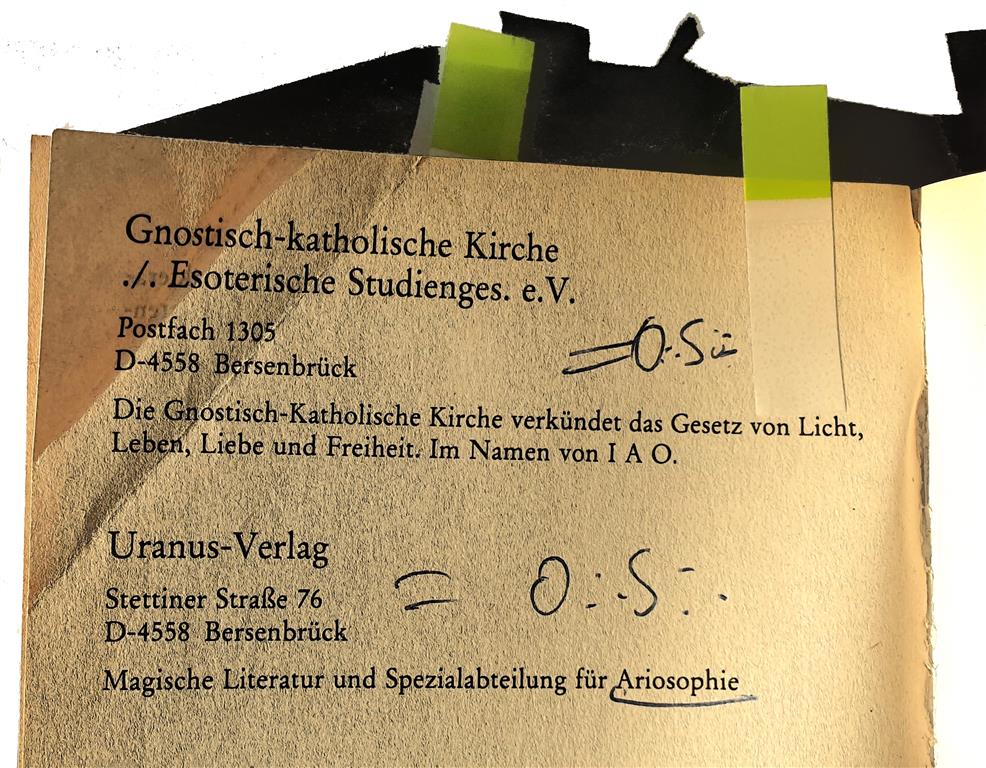
[From: "Spirituelles Adressbuch 86/87", Ahlerstedt 1985.] After he had been nominated by Heikaus as an Honorary Member of the OS in July 1986, Wedler returned the favour by appointing Heikaus as Grand Master and 30° on March 14th the following year. [159] The OS was able to recruit a few past Masters from the FS, and higher-degree members from Grosche's era; for instance the above mentioned FS 'Triumvirate' of 'Giovanni', 'Fabian', and 'Arminius', found a home in the ranks of the OS. Indeed, the latter two joined after Heikaus's appointment as Hierarch - 'Arminius' on March 19th 1988 and 'Fabian' on February 4th 1989; subsequently Heikaus was installed as 'Gotos' on March 4th 1989. Of the 18° members from the FS, only the Swiss Emil Forrer "Domani" converted in December 1987. The Ordo Saturni was officially incorporated as a society in Bremen; its member's subscriptions being recorded as going to the Esoteric Study-Group in Bersenbrück. Both group's separate constitutions stated that members of the Ordo Saturni had no right to speak at meetings. According to the OS's regulations of 1978 and 1982, its group-funds belonged to the 'Order of Set' in Osnabrück mentioned above. The Gnostic Catholic Church in Germany was supposedly founded in January 1980 by Dieter Heikaus, under his motto of 'Set-Horus'. This Church's activities - announcements in specialist magazines, entries in esoteric directories, and letters to correspondence columns, etc., [160] - at least indicate it did exist. Its apostolic succession is claimed to descend from the Polish Mariavite Church; although there is nothing magical in the transubstantiation of wine and bread from the theological standpoint, it is otherwise in the "twilight world of the Wandering Bishops." [161] This apostolic succession allegedly derived from Archbishop Paulus N. Maas, who had been made a bishop on October 9th 1949 by Marc-Marie-Paul Fatôme, who had in his turn been consecrated by Micheal Kowalski on September 4th 1939. [162] The Order of Mariavites originated in Poland, being instituted in 1890 by Maria Kozlowska, and in the early part of 1991 was conferring "Friendship Blessings" for gay couples in Cologne. 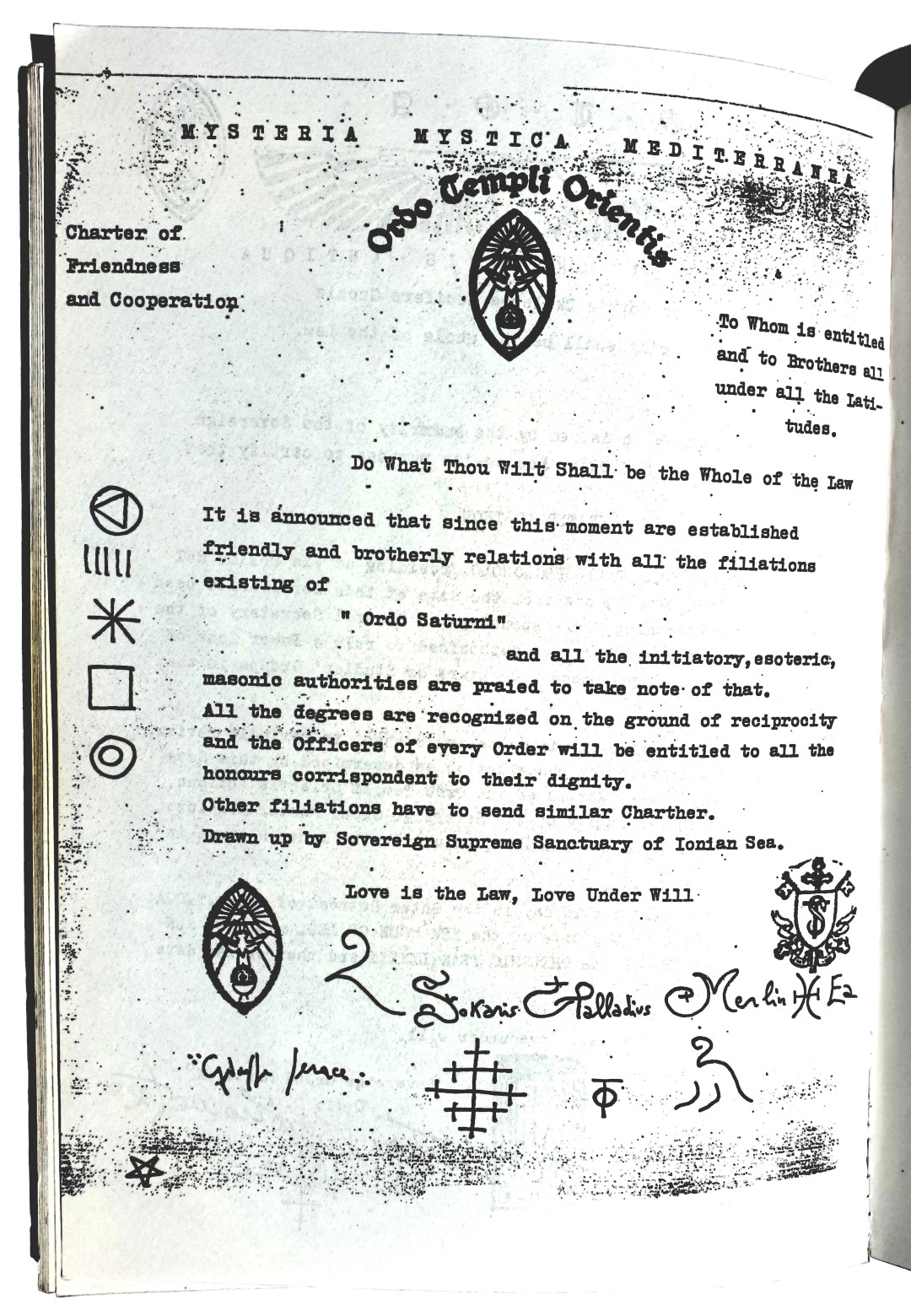
Context: Ordo Templi Orientis in Italy. Tiny little scandalKarl R. H. Frick, who belonged to the same Masonic Lodge as Wedler, learnt through him of Heiner Fabian 'Cornelis' and his manuscript entitled "Blutmessen und Satanismus" ("Blood-Masses and Satanism") [Part One]. [163] The "naive" Frick cited the OS as the 'Ordo Satanas' in his book "Satanismus und Freimaurerei" ("Satanism and Freemasonry"). [164] Likewise, Paul Ruediger Audehm (born 1942) felt that he had been deceived by Frick, to whom he had supplied material in good faith for the book. [165] The same is reported by many other authors as well. 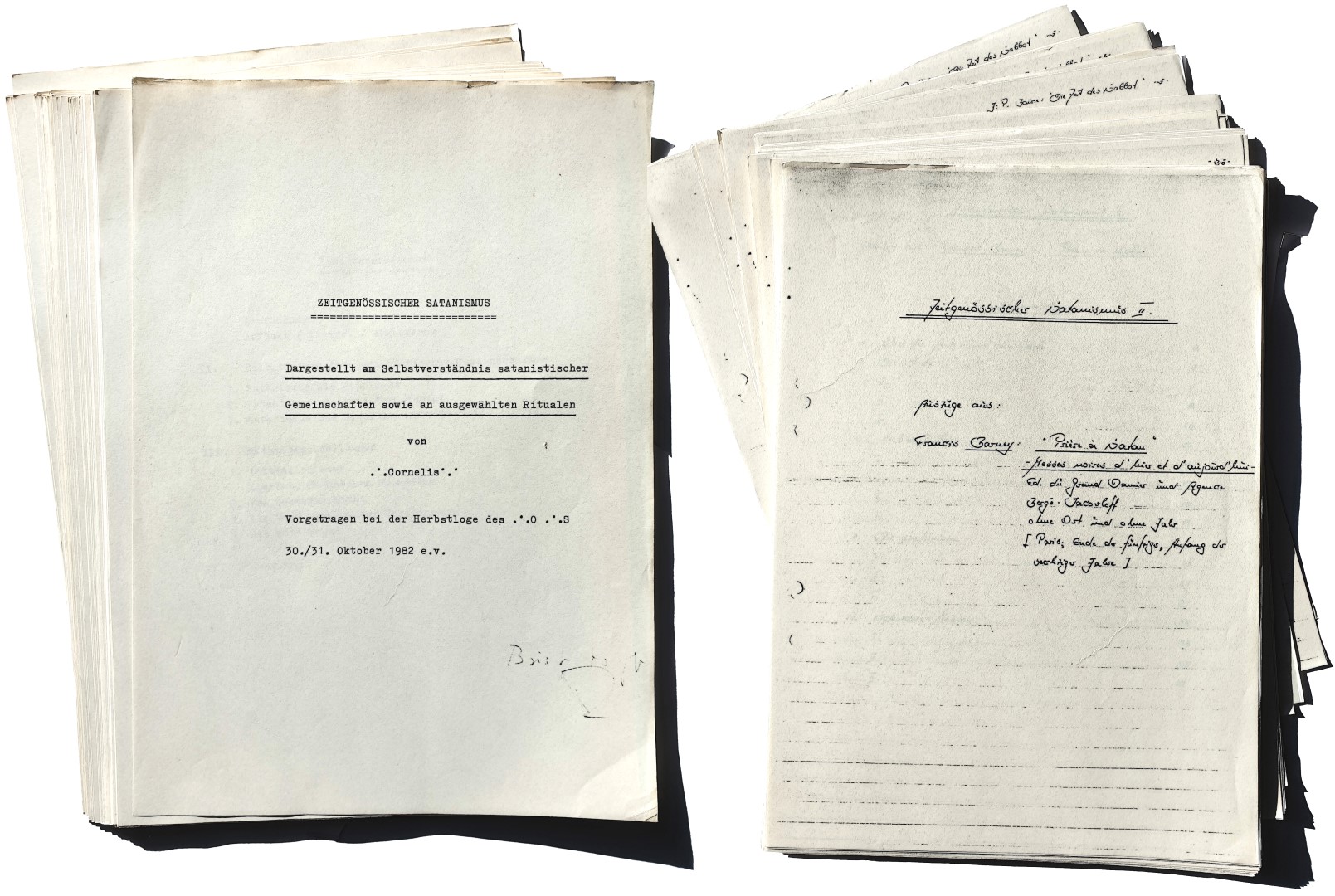
"With Divine Sperm I anoint thy head." [166]Jürgen Gisselmann "Merlin" appeared with Ulla von Bernus "Anata" on the German television programme magazine 'Hör Zu', [167] while he was still too young to join the Fraternitas Saturni; hence Karl Wedler took him under his own wing. The friendship between Anata and Merlin degenerated into a split when Merlin tried to demolish Anata's belief in UFOs. Merlin wrote for both for "Marabo" ("Local Paper for Bochum and District") - where a certain Werner Schmitz also worked [168] - and for "Playboy's" German edition. He soon became prey to fears that he was being persecuted by black magicians, and committed suicide aged just 25, on October 2nd 1979. The aforementioned Schmitz eventually accounted the circumstances of his suicide as a detective novel: "Auf Teufel Komm Raus" [169] - he was supplied with information for his piece by Dieter Heikaus. After this story appeared, leaflets were distrubuted in Wedler's home-town revealing his identity; [170] Heikaus now became "indignant". Ulla von Bernus (born circa 1914) nonetheless achieved her moment of fame; on August 17th 1984, she again appeared on TV channel ZDF and in the magazine 'Hör Zu' [171] celebrating a magical ritual, and revealed her occult price-list on the programme, which included a charge of 30,000 Deutschmarks for magically killing someone at a distance. Pastor Sommerauer, who subsequently took Frau von Bernus to court, was incensed; but on the evidence she was ruled to have merely committed an "illusory crime exempt from punishment." [172] On these grounds, Frau von Bernus was of course required to repay the 30,000 DM, as the assize court in Kassel judged that the whole business "had been objectively impossible from the start." [173] The son of Wolther or 'Daniel', Patrick, became Frau Bernus's magical pupil. Heikaus tried in vain to get hold of Merlin's Order documents, but Jürgen Gisselman's mother had destroyed almost all of them after his suicide. [174] In that same year 1987, when Schmitz's report appeared, recruitment-leaflets for the OS surfaced at the high school in Quackenbrück; local parents promptly threatened to withdraw their children from the school. The tabloid press warned of dangers to the innocent, [175] while parish magazines printed examples of Ordo Saturni insignia, [176] quoting Horst Knaut and F.W. Haack. "Just now the Devil's loose in our district. The churches are on the attack; the criminal police and the public prosecutor have been called in - and a local case of suicide has been linked to us" complained Heikaus, [177] who was removed from his office as school teacher in March 1988. The papers reported rumours that the authorities were looking into allegations about Heikaus: he had supposedly been distributing writings (and films too) that were harmful to the young, and it was even claimed that he'd been promoting neo-Nazi ideas; but these accusations all proved to be totally groundless. [178] Because of all the press-attention, a number of gaps appeared in the ranks of the OS's higher echelons; these were rapidly filled by newcomers putting themselves forward - most of them members of the 'Caliphate' - which promptly caused further disquiet. Heikaus then founded the 'Ordo Templi Orientis Saturni' ("its name has duly been registered as a trade-mark"). [179] Many members left at this juncture; some had neglected to pay their 120 DM membership fees, and promptly heard from Heikaus's lawyer. [180] In May of 1993, several members tried to remove Heikaus as Grandmaster: accusation against him was of accounting discrepancies in his conduct of a legally incorporated association. [181] None of this seems to have upset Heikaus, perhaps because Gertrude Zellhuber had presented him, and the Ordo Saturni, with a child on August 18th that year; he was called Artur, and as the reincarnation of Eugen Grosche, was apparently predestined to steer the heavily-laden Saturnian ship through further stormy waters... Johannes MaikowskiJohannes Maikowski [Immanuel], member since 1950/1955 was appointed as his successor and Grand Master of the 'Fraternitas Saturni' by Eugen Grosche in December 1963. He was re-elected by his own adherents in 1964/65. His group was also called 'Fraternitas Luminis Ordo Reginus Adeptorum' (FLORA) or 'Ortsloge Fraternitas Luminis'. Maikowski was not recognized by all members. In 1983, there was an election of a new Grand master by a competing F.S. group, which forced him to abandon the name of the lodge in the same year. So in 1993 he founded alternatively:
There were dual memberships with the Ordo Templi Orientis and regular Freemasonry. Maikowski declared his own lodge foundations soon to be null and void. Yet, some of these lodges remain to exist. In 2003 the GAG united with the formerly competing 'Fraternitas Saturni' in Berlin. Maikowski still considers himself the only legitimate Grandmaster. By 2009 he had founded:
He is still convinced to be the only legitimate successor to Eugen Grosche although he rejects the proclamations of the old 'Fraternitas Saturni' i.e. "Love is the Law - Love under will - Pitiless Love" and "Do what thou wilt" ["Thelema" according to Aleister Crowley]. 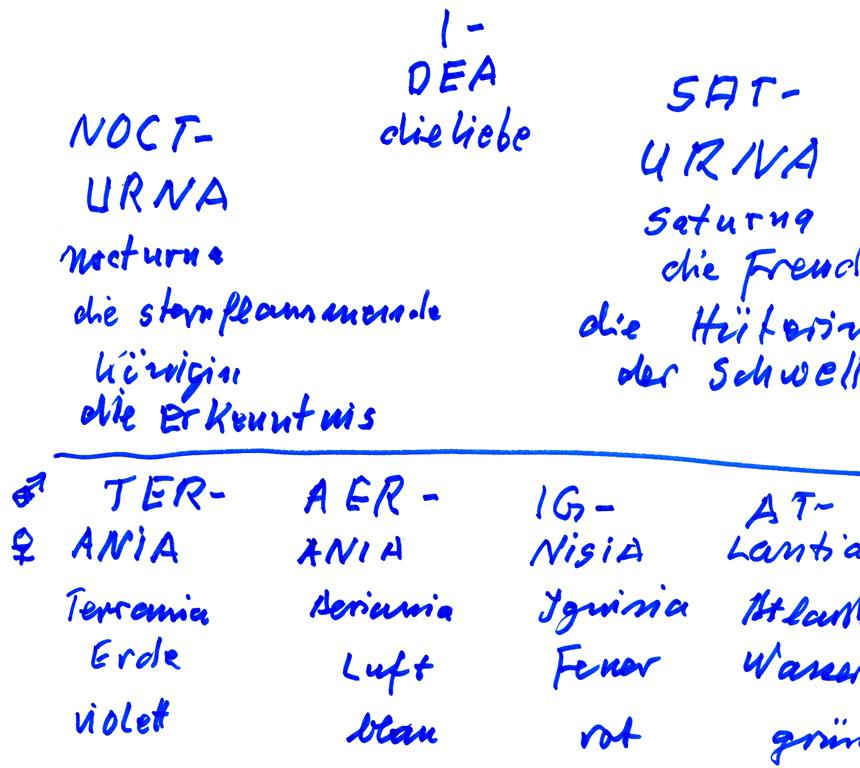
Online mit, von und über Johannes Maikowski:
NOTES TO CHAPTER 6, 1994
© Peter-Robert Koenig, 1994 Translated and adapted from a chapter on the O.T.O. Protagonists in "Das O.T.O.-Phänomen" (1994) by Mark Parry-Maddocks — German original online. An outline can also be found in the English "O.T.O. Rituals and Sexmagick" (1999) Tradução Portuguesa: In Nomine Demiurgi Saturni Short Dutch version Versiune romana: Fraternitas Saturni. Istorie si protagonisti In Nomine Demiurgi Saturni 1925-1969 First installment of 400 pages of saturnian documents In Nomine Demiurgi Nosferati 1969-1998 Another 400 pages dealing with the History of the F.S. In Nomine Demiurgi Homunculi Further 420 pages about the F.S. Context: Peter-R. Koenig: Der O.T.O. Phänomen RELOAD, 2011 Johannes Goeggelmann / Frater Saturnius: Beispiel einer Skandalisierung durch den Boulevard. Adolf Hemberger, Horst Knaut, Friedrich–Wilhelm Haack. Completely updated. Sammlung von 21 Texten von Walter Jantschik Texte zum Thema GOTOS-BüsteDie GOTOS-Büste. Winke, Anregungen und Ratschläge für die Brüder und Schwestern der Loge Fraternitas SaturniWalter Jantschik: Die GOTOS-Belebung
De Destillatione "Suci Mulieris" Ad Servandam Valetudinem Magi In Nomine Demiurgi Nosferati: History and protagonists
Tradução Portuguesa: In Nomine Demiurgi Nosferati Versiune romana: Fraternitas Saturni. Istorie si protagonisti
ceská verze: SATURNSKÁ GNÓZE
Tradução Portuguesa: Saturno-Gnose: A Arte de Amar e Viver Versiune romana: Arta de a iubi si de a trai - Gnoza lui Saturn |
In Nomine Demiurgi Homunculi. 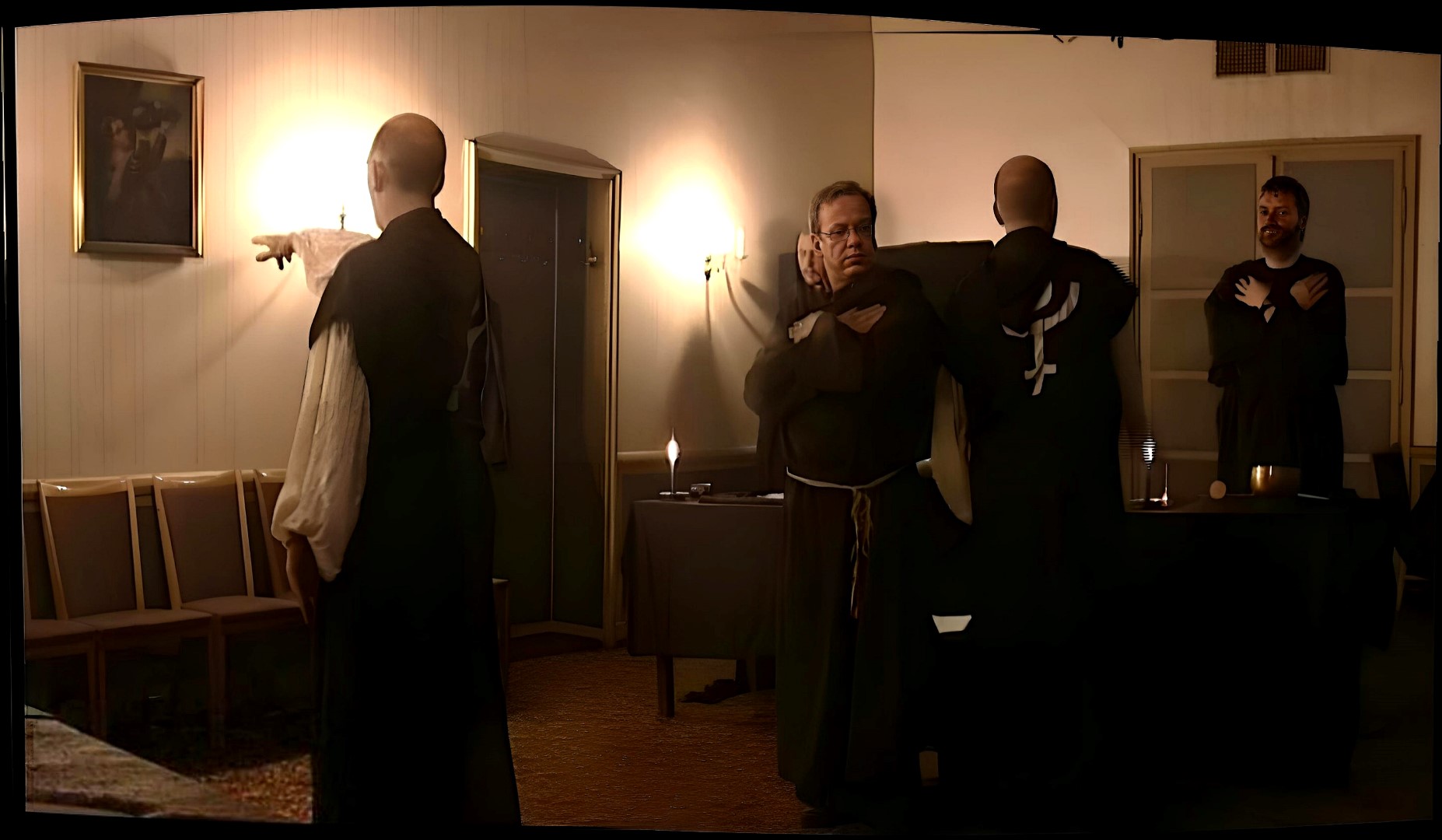
| The third volume on the Fraternitas Saturni. Johannes Maikowski: Fremdenlegionär, Gefangener im Stasi-Gefängnis Berlin Rummelsburg, Zweimal Grossmeister, Communitas Saturni und Communitas Solis, Grossloge Gregor A. Gregorius/GAG. Eugen Grosche: Bittere Nachkriegszeit, Die Stasi-Akten, Alt-Nazis in der Loge. Karl Wedler: Der Kelch, Die Palastrevolution, Die Kopiermaschine. Sexualmagische Unruhen um den 18°. Experimente mit Johannes Göggelmann und Horst Kropp. Der Ordo Saturni von Dieter Heikaus. Grossmeister und Stagnation: Guido Wolther, Walter Jantschik, Stanislaus Wicha, Joachim Müller, Heinz Conrad, Hartmut B., Ralph-Peter T. Zusammenschluss der GAG mit der F.S. Die Logendämonen: Der Meister GOTOS - Egregor? Exorial. Und: Wolf Rösler, Wilhelm Uhlhart, Richard Tschudi, die Elixiere des Teufels, die Tropfsteinhöhle in Frankreich, Walter Englert, der Berg Ipf, Horst Knaut, Adolf Hemberger, das Saturn-Kloster, Michael Gebauer, Martin S., Federico Tolli, Calix Borealis |
 Myth: The central concept in F.S. lodges is that of the lodge Egregore (group spirit). GOTOS by name and created as a bust. This is also the highest rank in the F.S. (from 'Gradus Ordo Templi Orientis Saturni'). Truth: Johannes Maikowski, Grandmaster of the Fraternitas Saturni, appointed as successor by Eugen Grosche in December 1963, speaks with Peter-R. Koenig in August 2011. |
|
Johannes Maikowski berichtet über die Büste GOTOS. Was geschah damit nach dem Tode von Eugen Grosche? Wofür interessierten sich die Mitglieder? Warum der Name Saturn? |
 Eugen Grosche ernennt Johannes Maikowski am 23.12.1963 zu seinem Nachfolger als Grossmeister der Fraternitas Saturni. Wie erfolgte die Erhebung in den 18°? Was war mit Walter Englerts 18°? |
 Johannes Maikowski erinnert sich an Walter Englert, Margarete Berndt, Karl Spiesberger, Herman Wagner, Walter Jantschik, Horst Kropp, Guido Wolther und an den Putsch 1962, angezettelt von Karl Wedler und Wolf Rösler |
 Bis vor seinem Tode war Eugen Grosche (1888-1964), der Gründer der Fraternitas Saturni, völlig gesund. Es gab keinen Logenraum. Wilhelm Reichs ORGANON-Kasten. Was hat Grosche am meisten interessiert? Was wusste Johannes Maikowski / Immanuel von Grosche? Ria Grosche war immer alleine. Gregorius war der Über-Papa. Eugen Grosche war Mitglied der Evangelischen Kirche. |
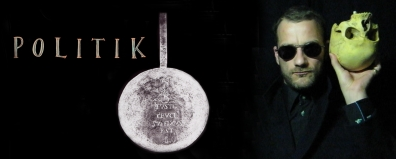 Eugen Grosche hat nie über seine Emigration in die Schweiz und Italien gesprochen. Er hat sich auch nie über seine politischen Ansichten geäussert. Grosche lebte von seiner Buchhandlung und den Mitgliederbeiträgen. Warum hat Grosche Nazis in der Fraternitas Saturni geduldet? Es fiel niemals ein antisemitisches Wort. Miriam Wolther, eine ehemalige jüdische KZ-Insassin, hat sich ebenfalls nie geäussert. |

|
 Autogenes Training - Yoga für den Westen - Johannes Heinrich Schultz - Rückverbindung mit der Gottheit - Anbindung an Gott - Geistseele - Hypnose - Fraternitas Saturni - Traumexerzitien von Gregorius / Eugen Grosche |
|
|
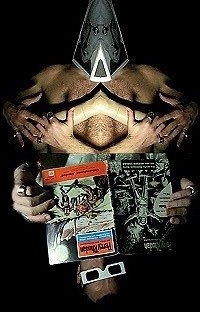 |
Main page about the Fraternitas Saturni.
Main page about the Typhonian O.T.O.
Pictures + Documents.
To the other Chapters of the English online version of "The O.T.O. Phenomenon" book of 1994.
Das Milieu des Templer Reichs — Die Sklaven Sollen Dienen. Hanns Heinz Ewers — Lanz von Liebenfels — Karl Germer — Arnoldo Krumm–Heller — Martha Kuentzel — Friedrich Lekve — Hermann Joseph Metzger — Christian Bouchet — Paolo Fogagnolo — James Wasserman. Unbequeme Aspekte in der Geschichte des O.T.O. und Thelema.
- English version: The Templar's Reich — The Slaves Shall Serve.
- Traduction française : Le Milieu du Reich des Templiers. Les Esclaves Serviront.
- Tradução portuguesa : O Ambiente do Reich dos Templários — Os Escravos Servirão.
- Traduse in romana: Reich–ul Templier — Sclavii trebuie sa serveasca.
O.T.O. Phenomenon navigation page | main page | mail
What's New on the O.T.O. Phenomenon site?
More about all this in: Andreas Huettl and Peter-R. Koenig: Satan - Jünger, Jäger und Justiz
Scattered On The Floor
Browsing Through The Rituals
|

